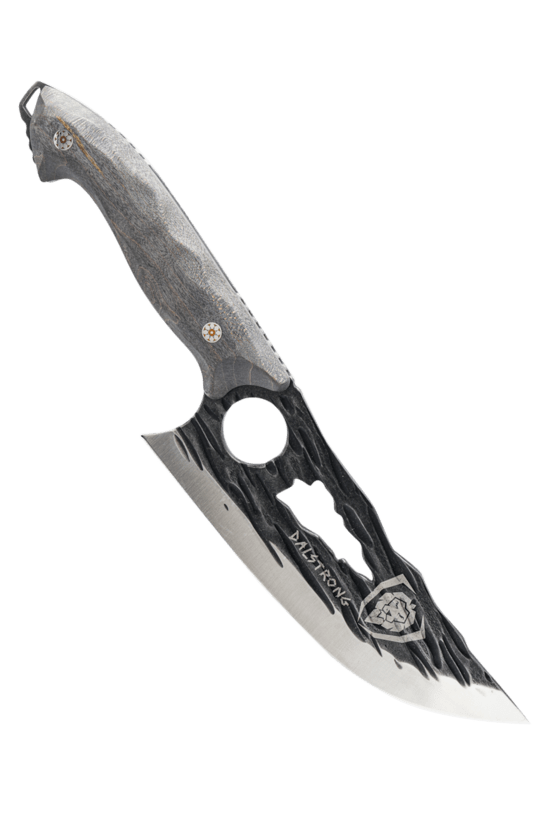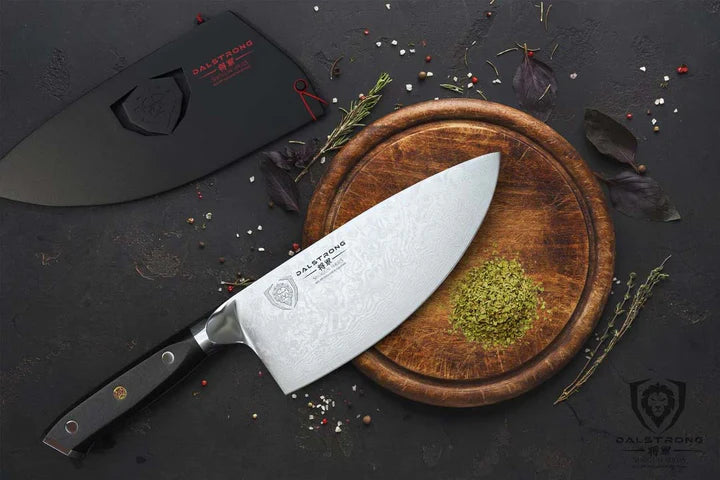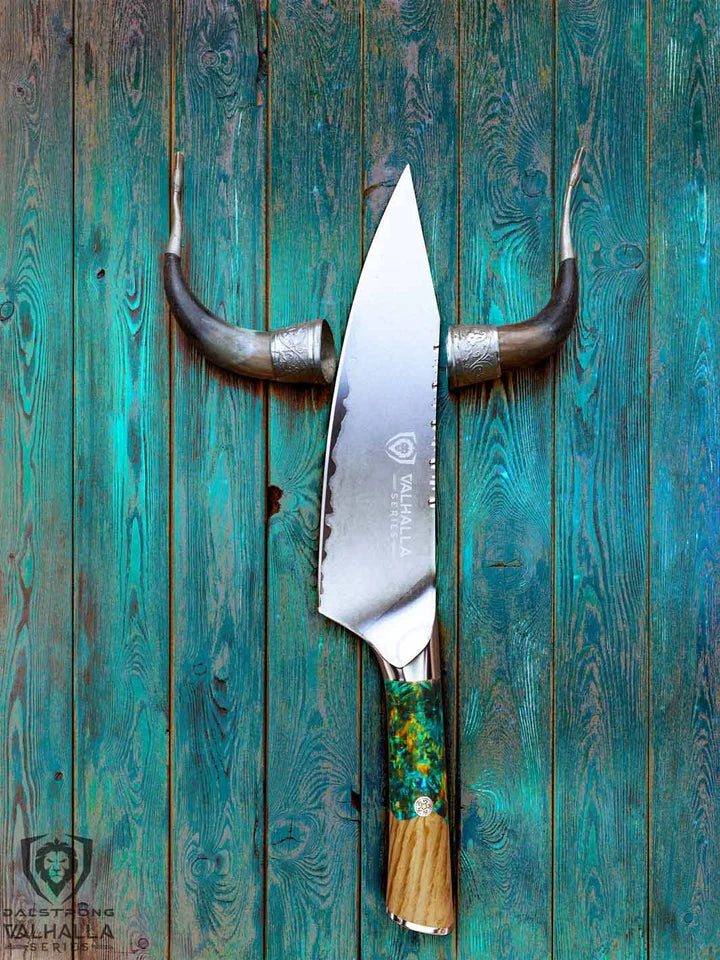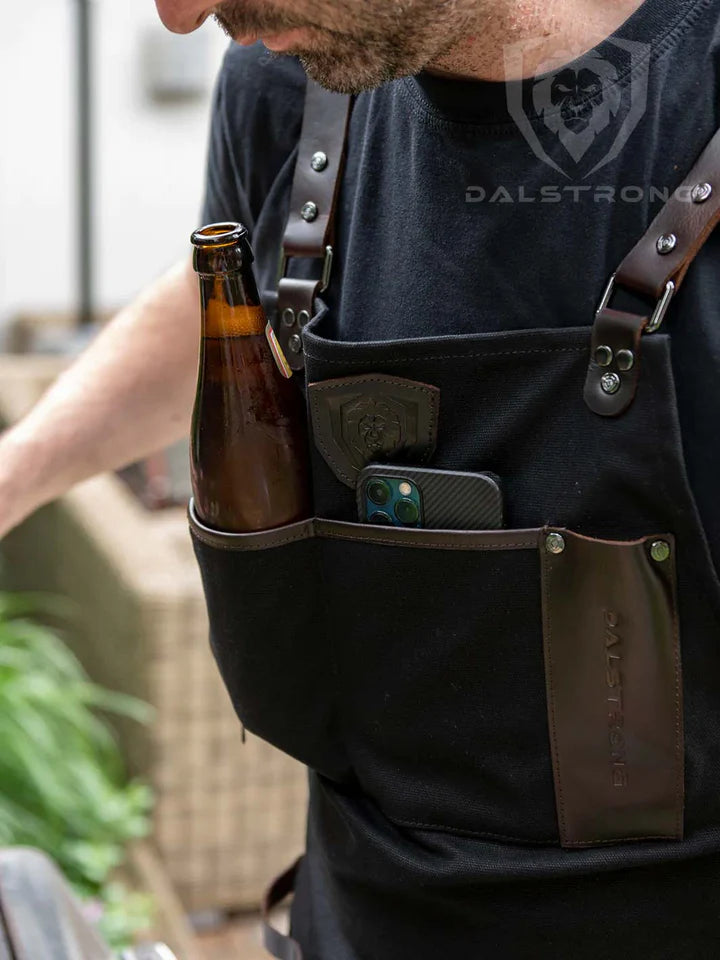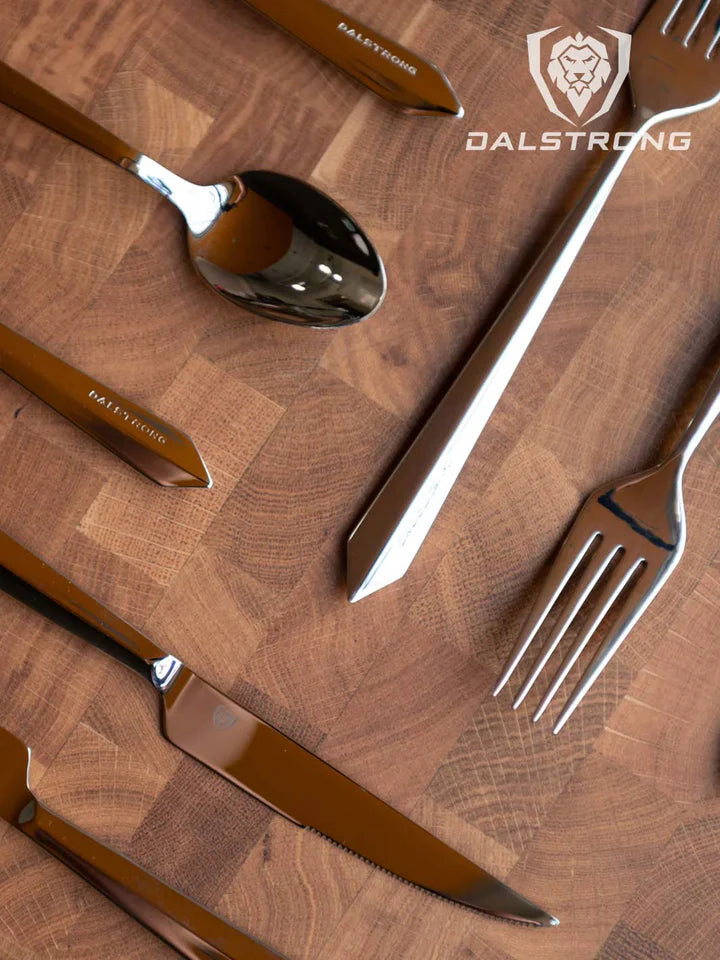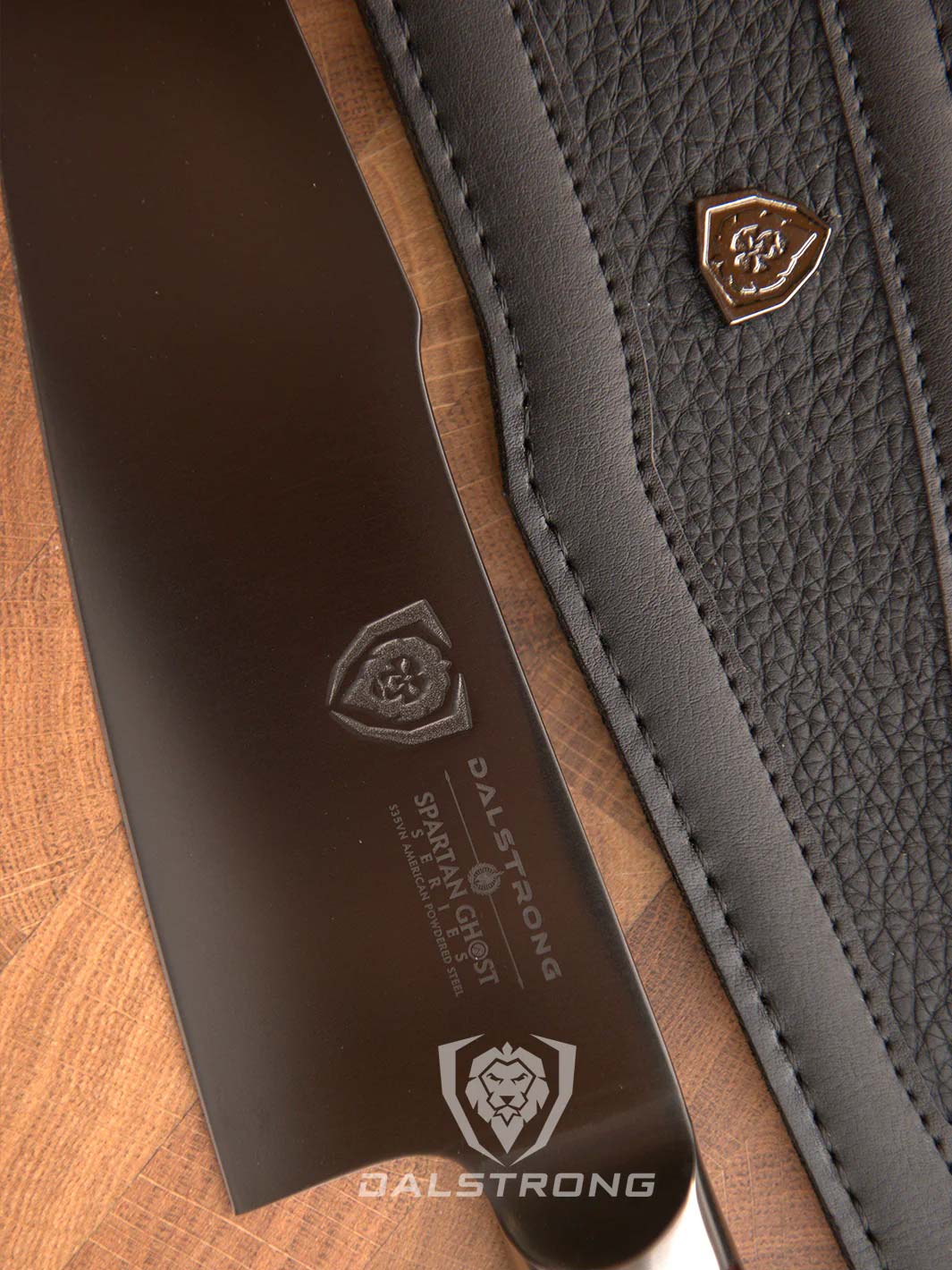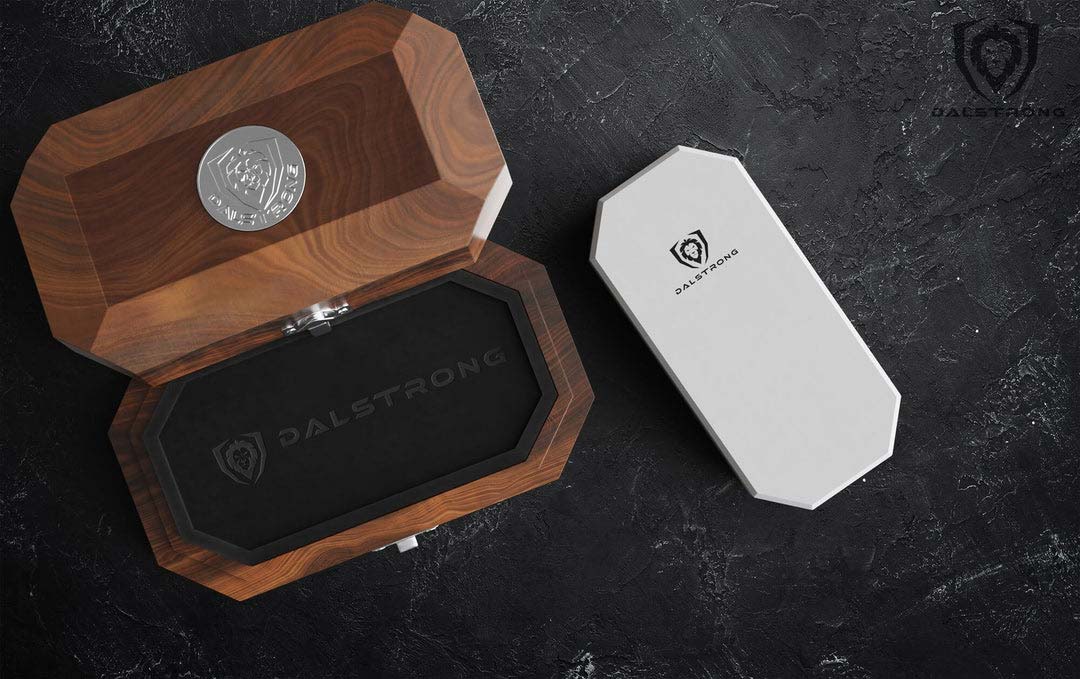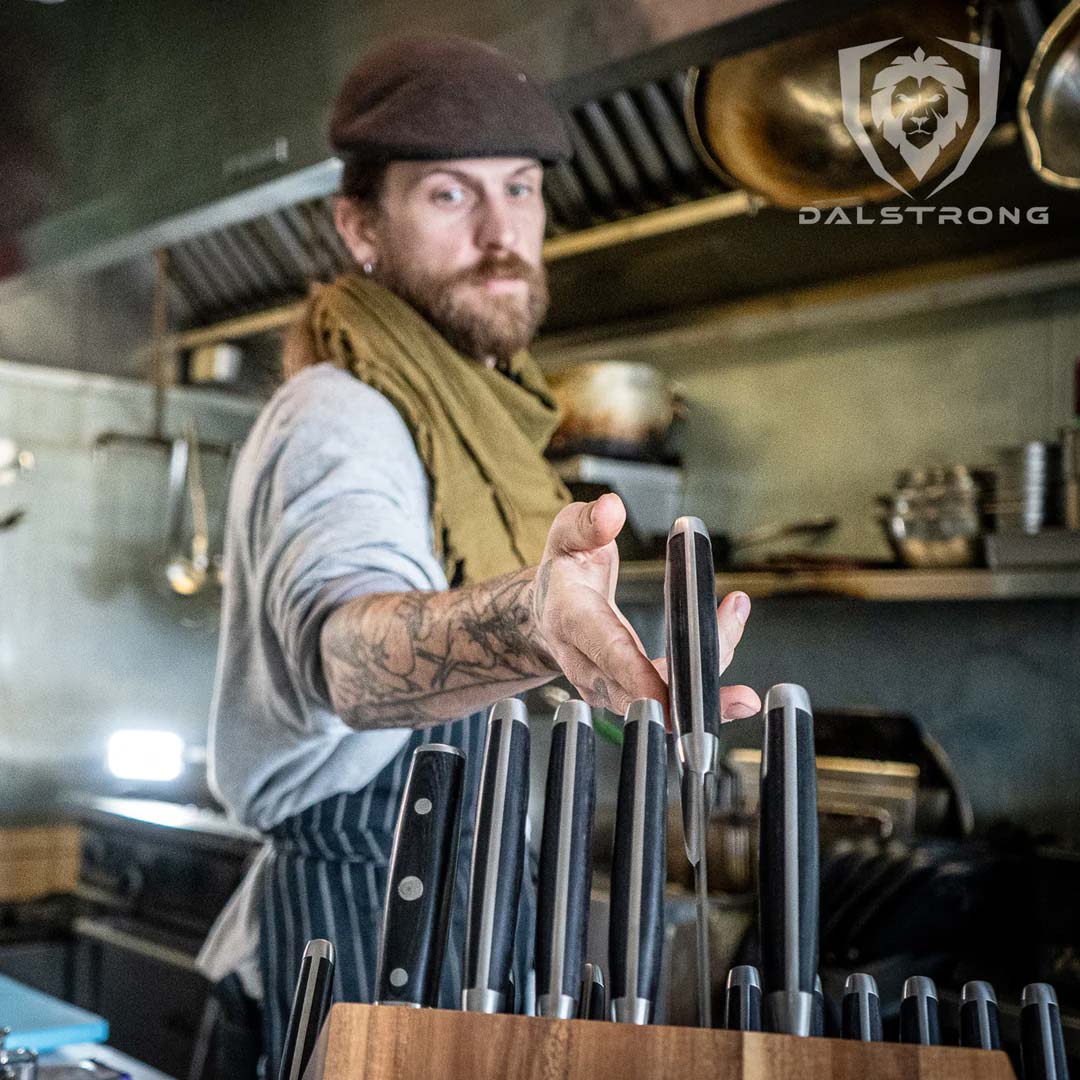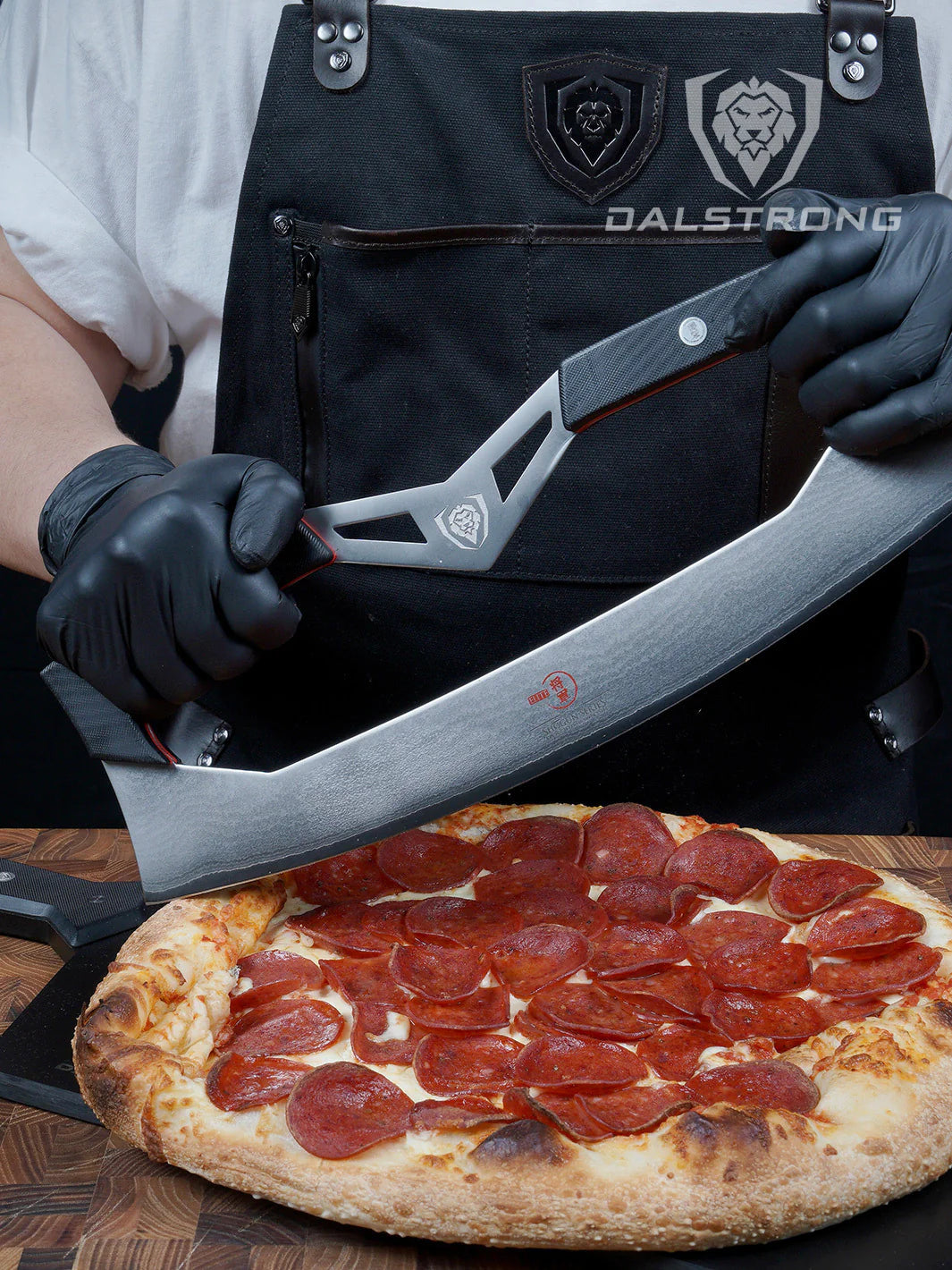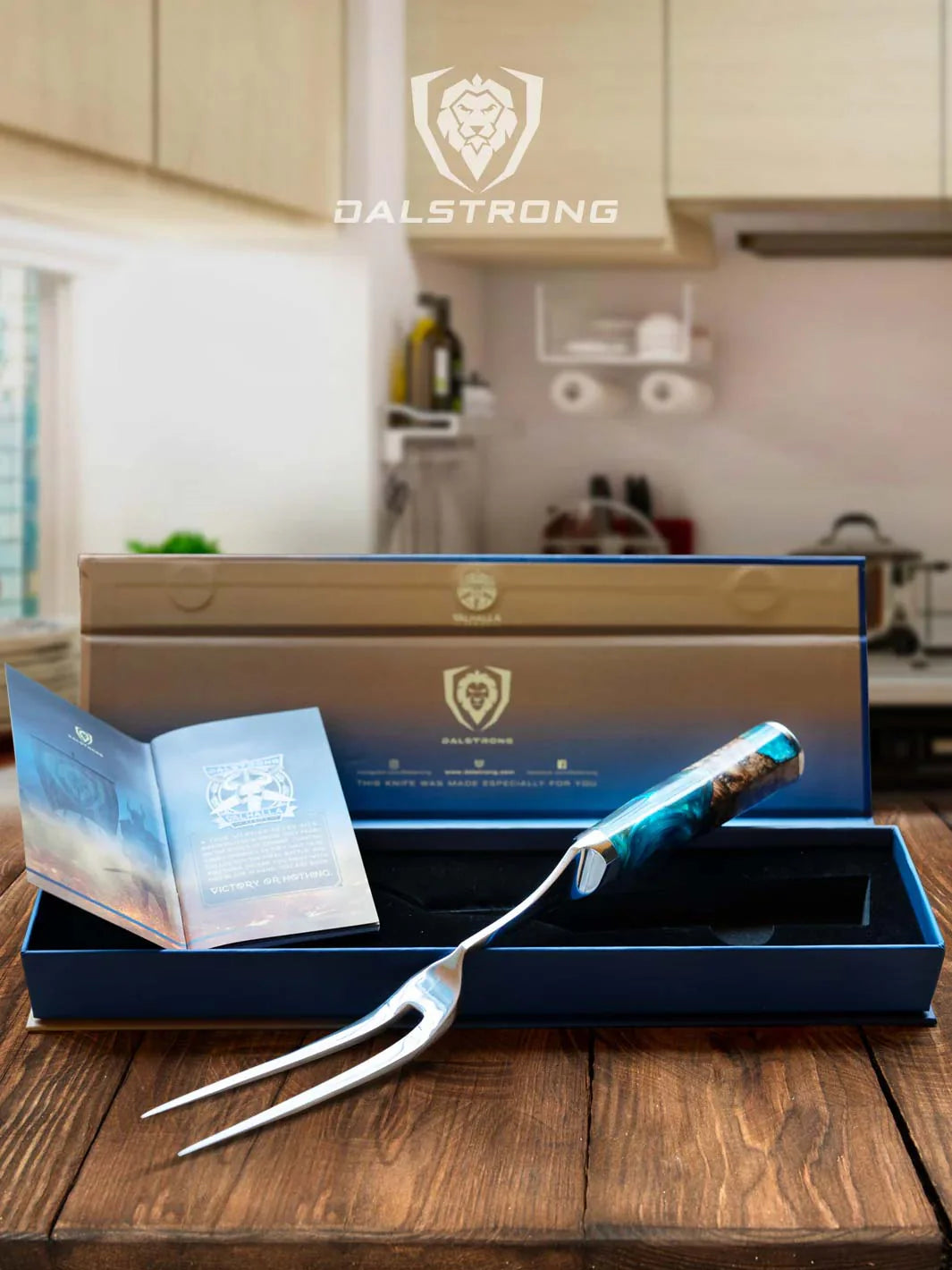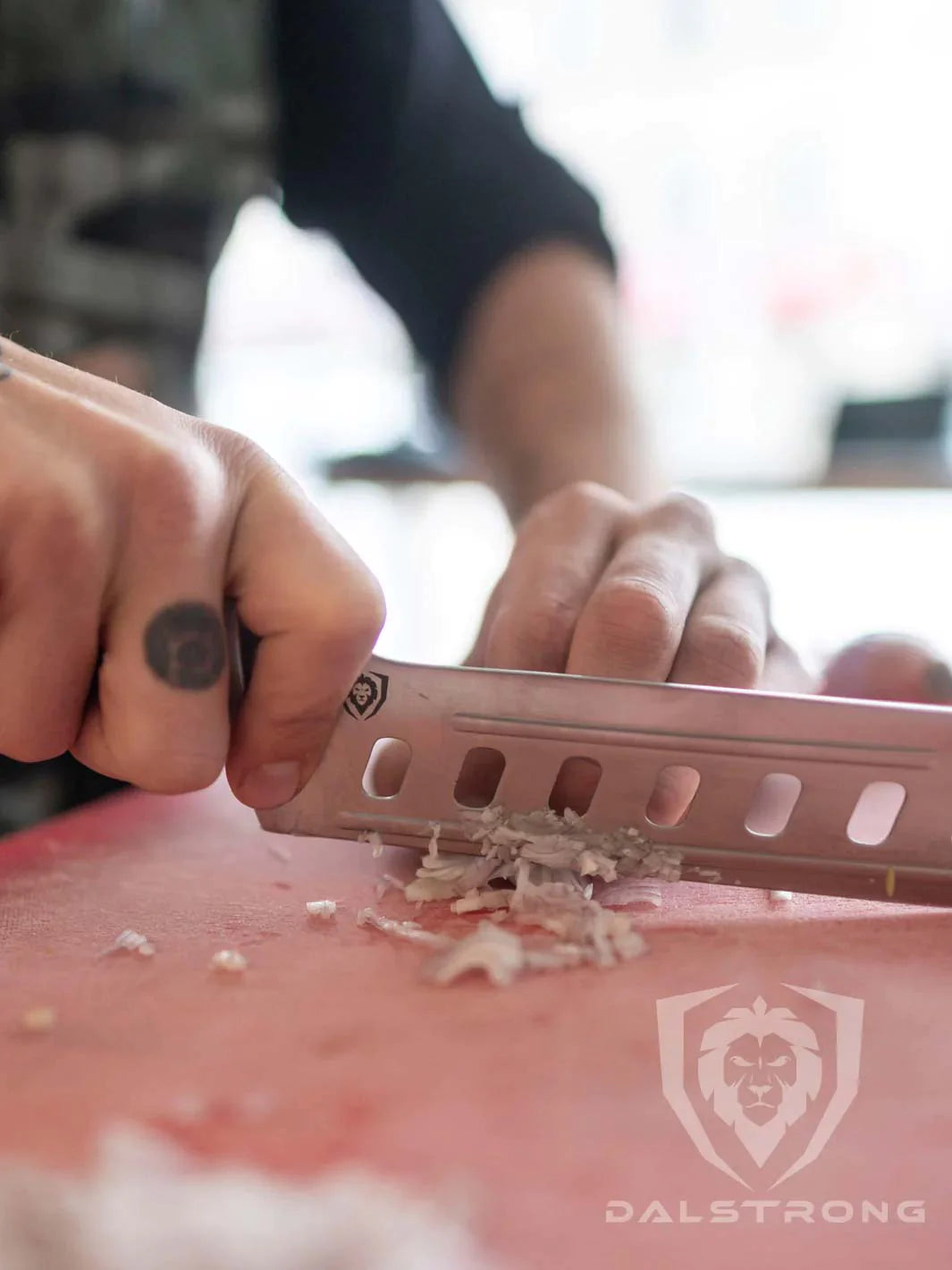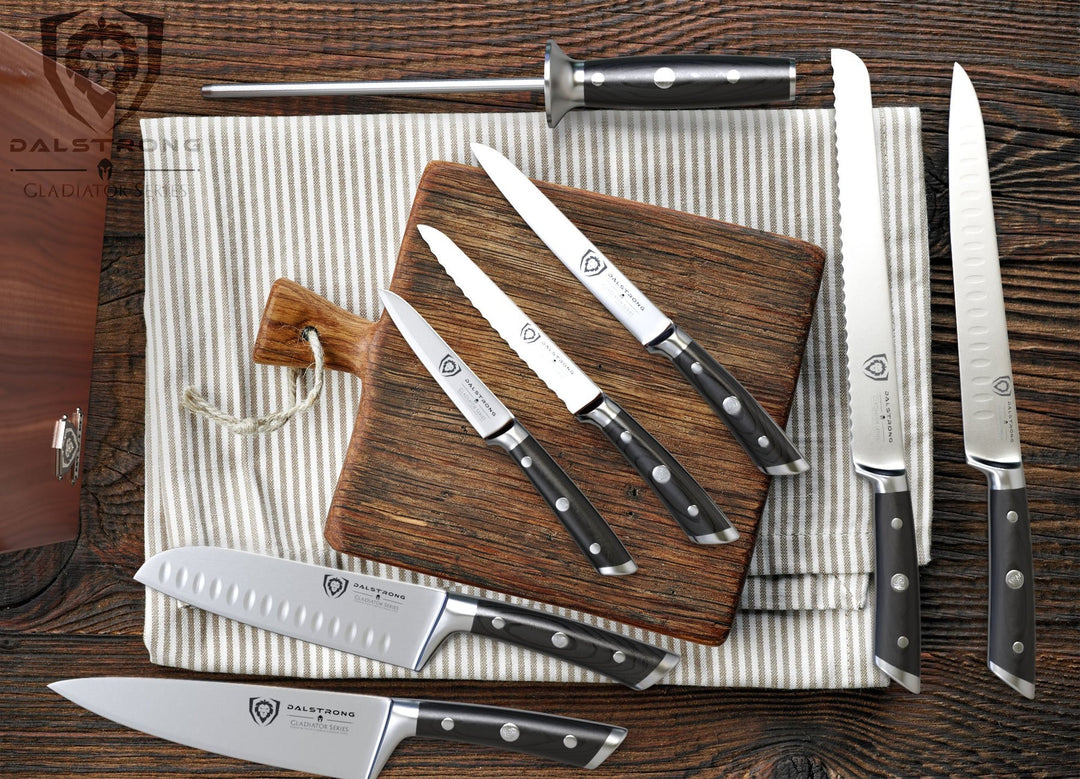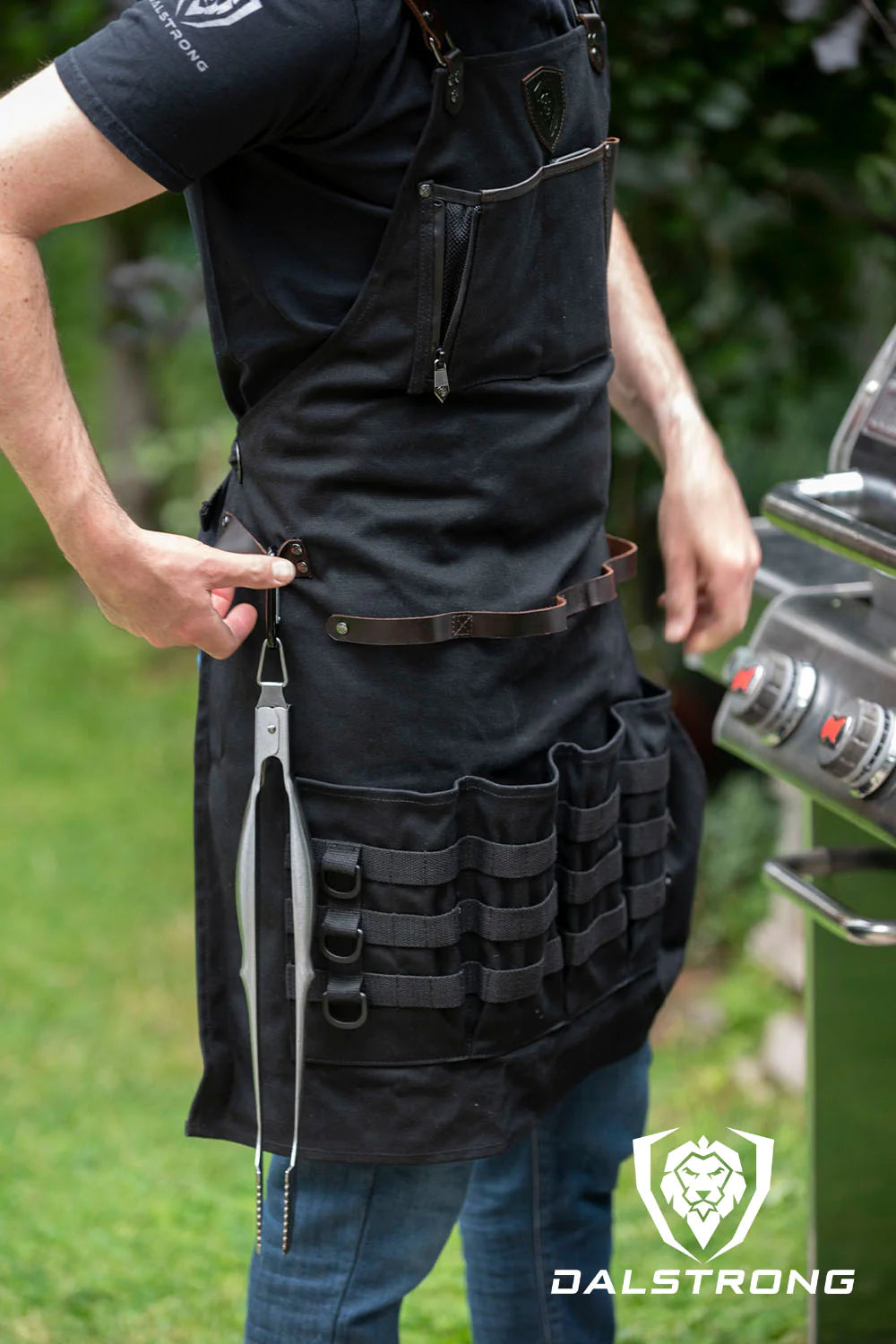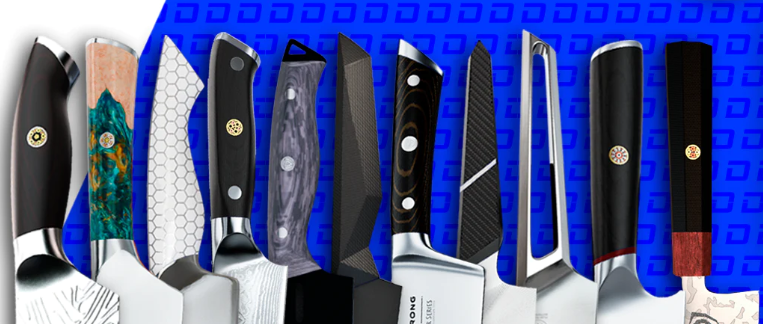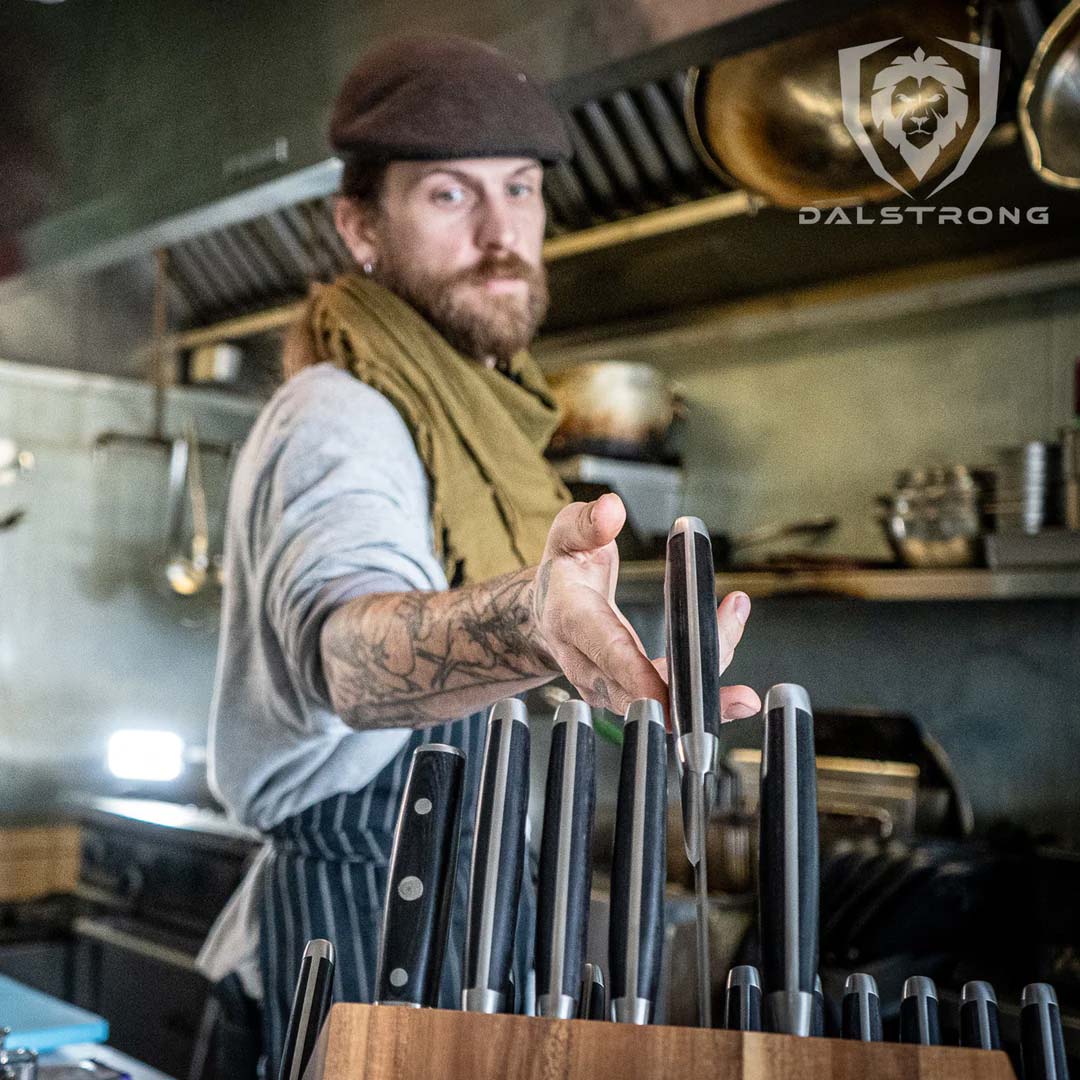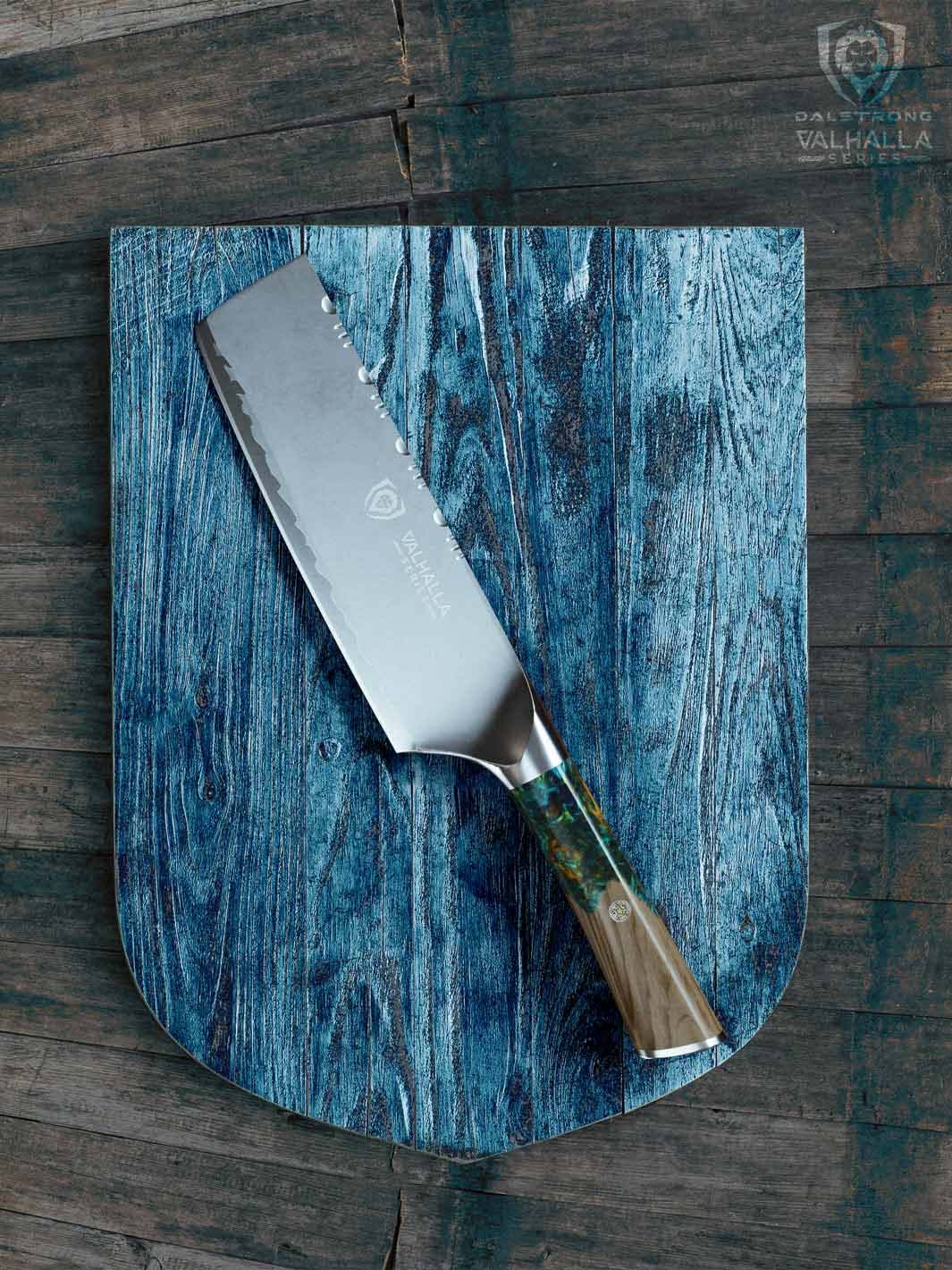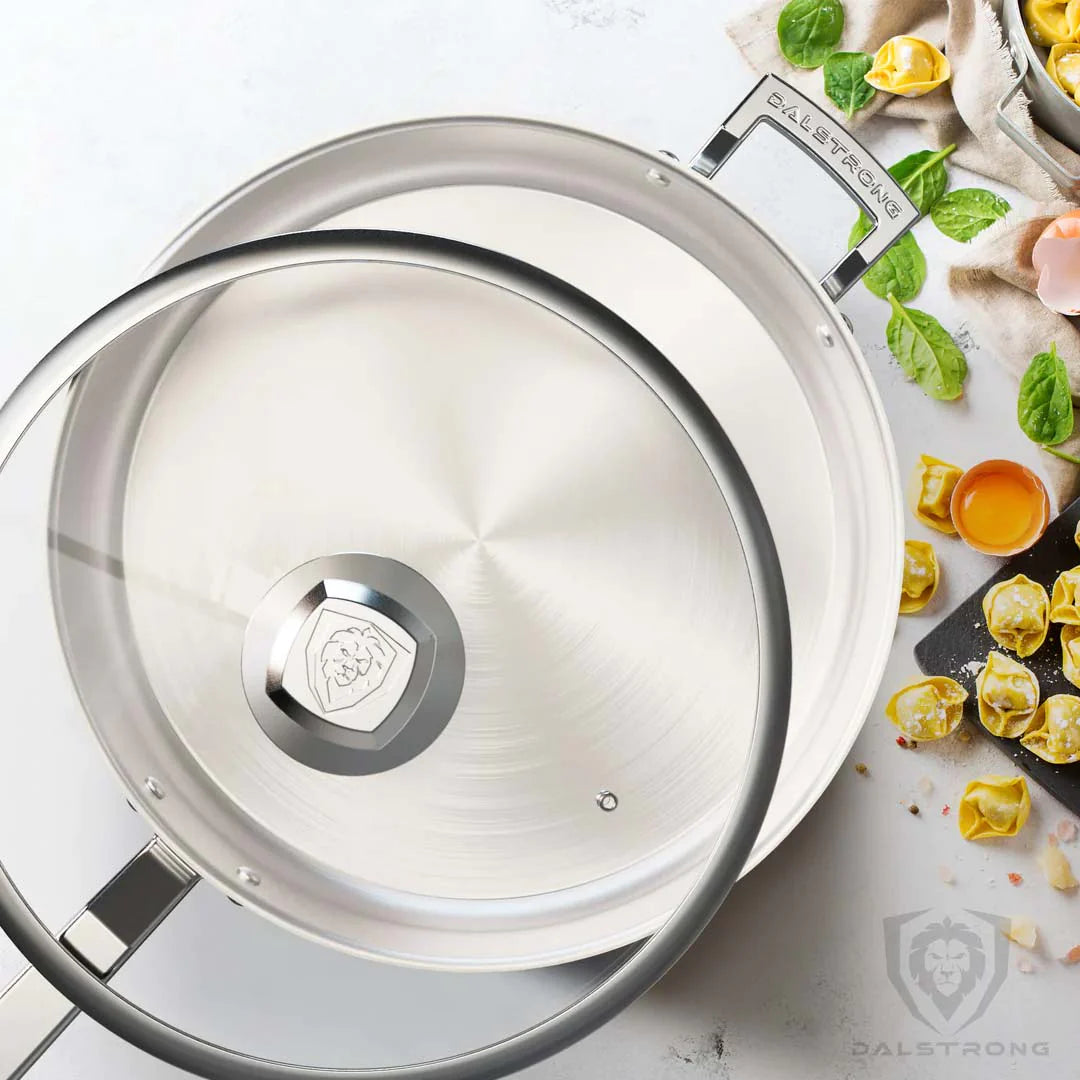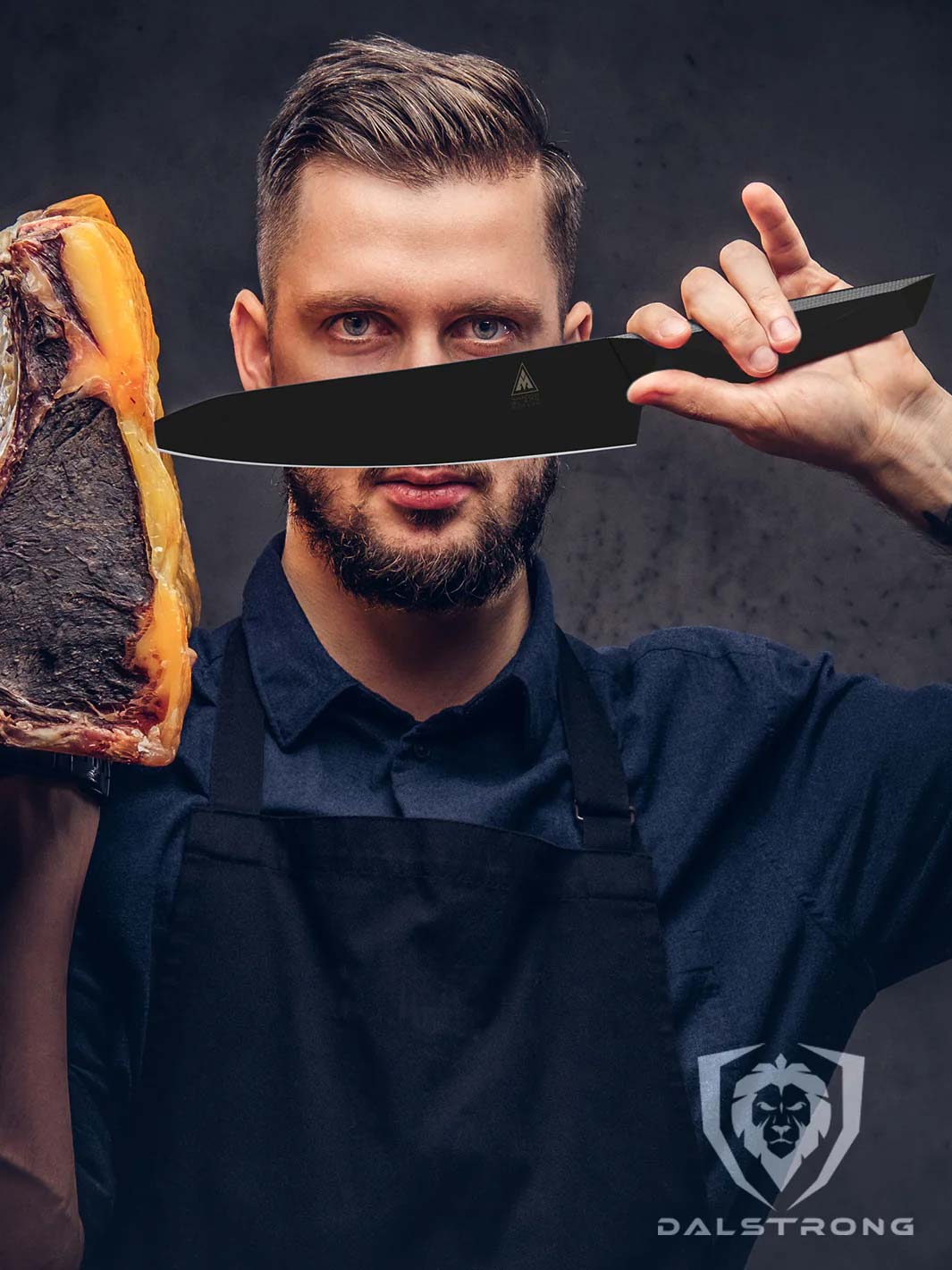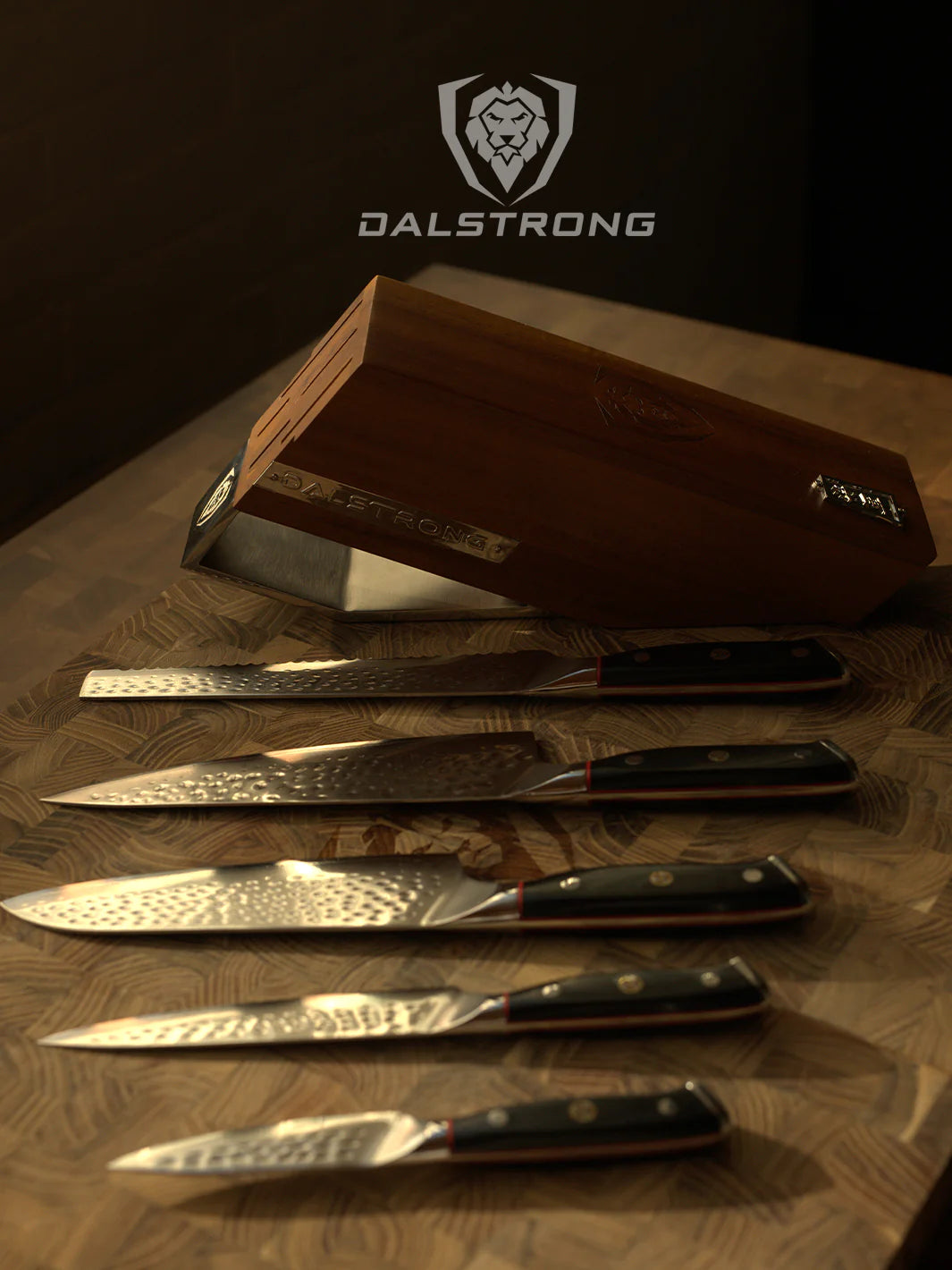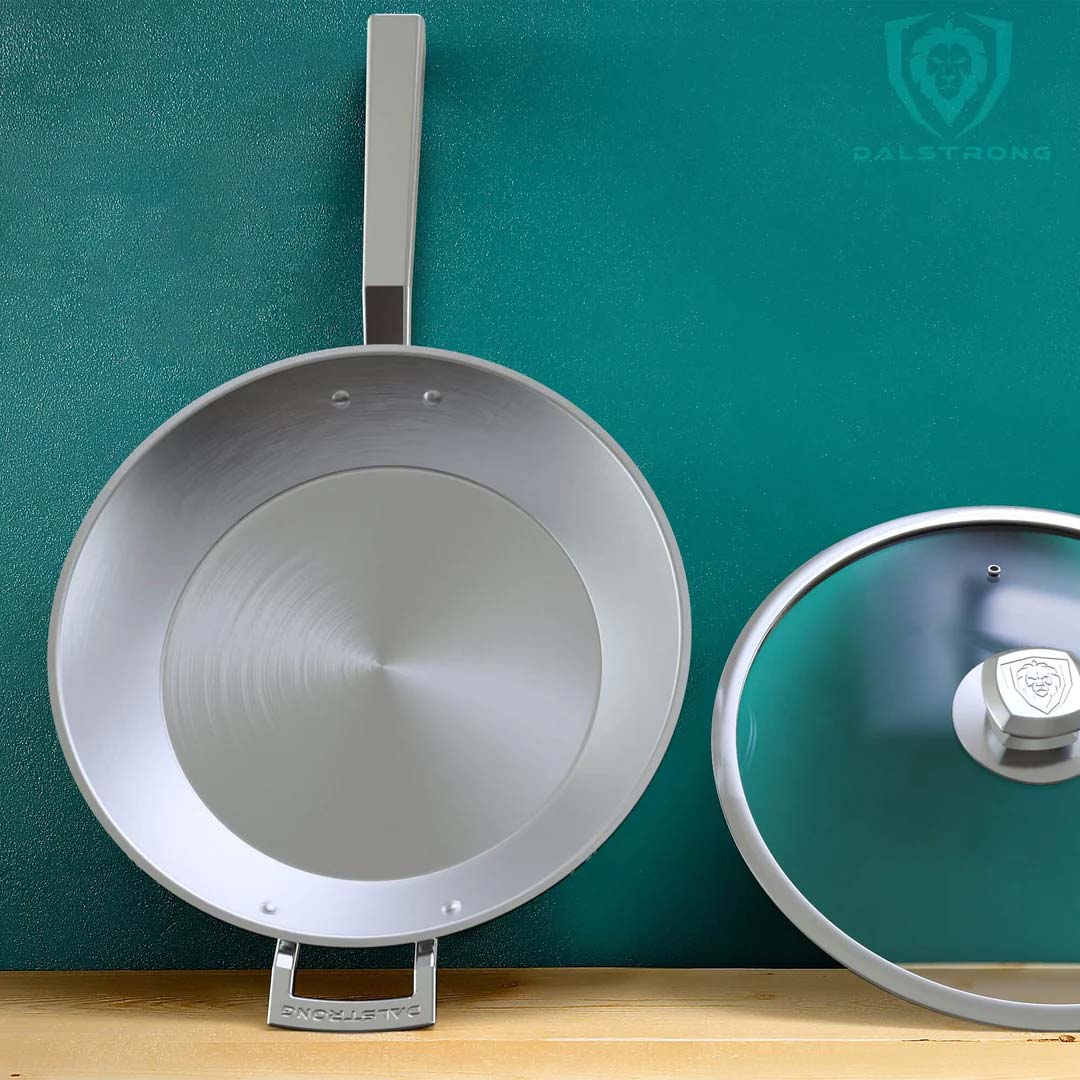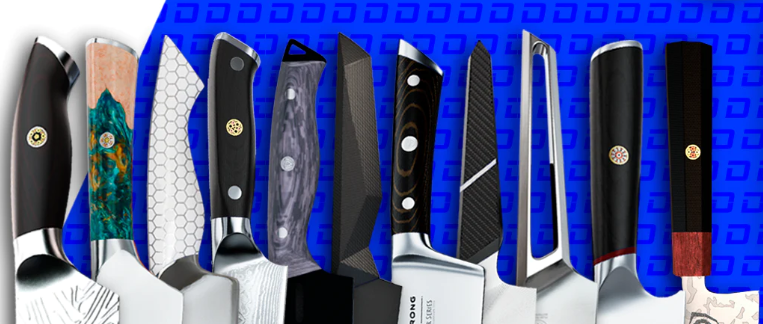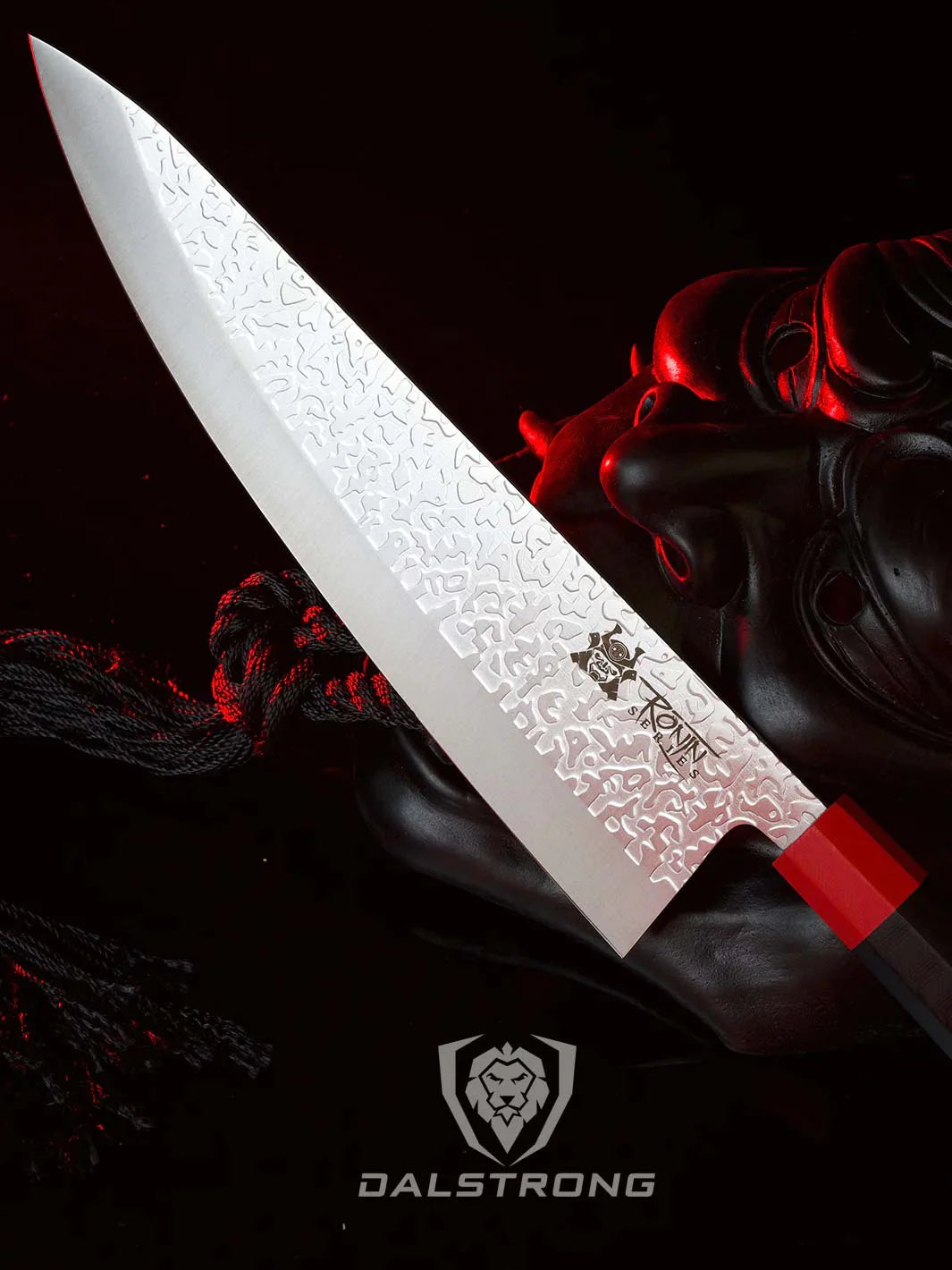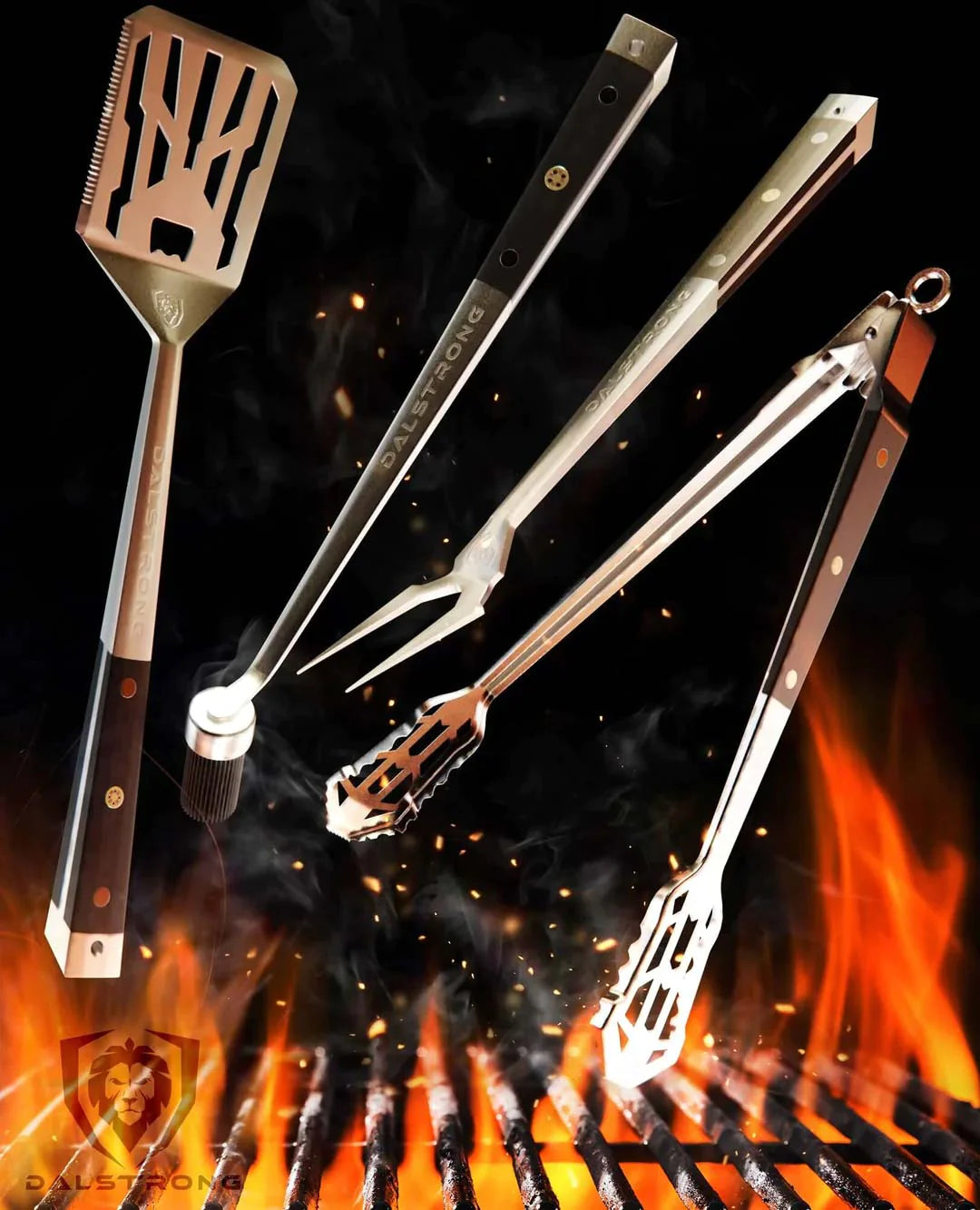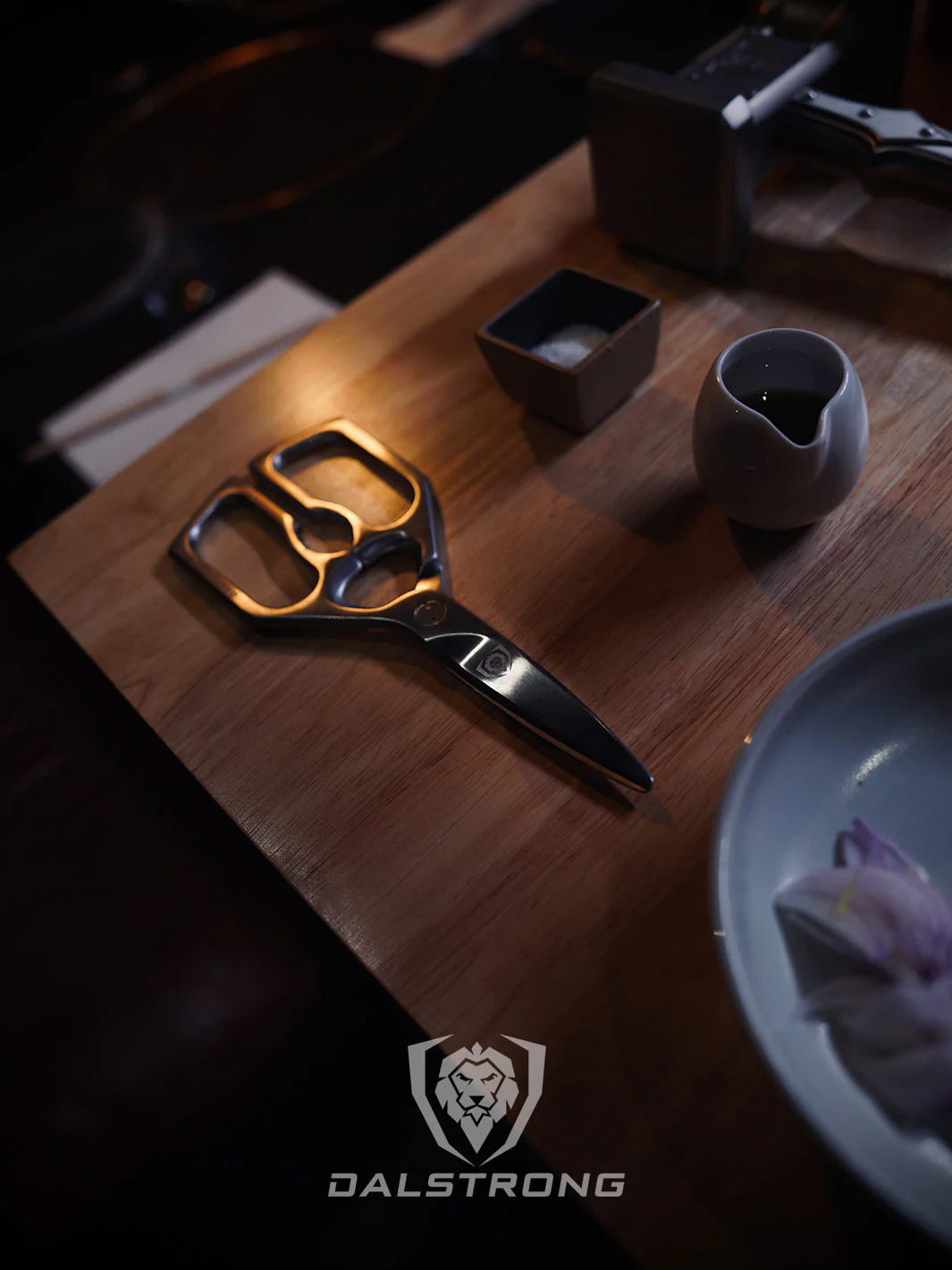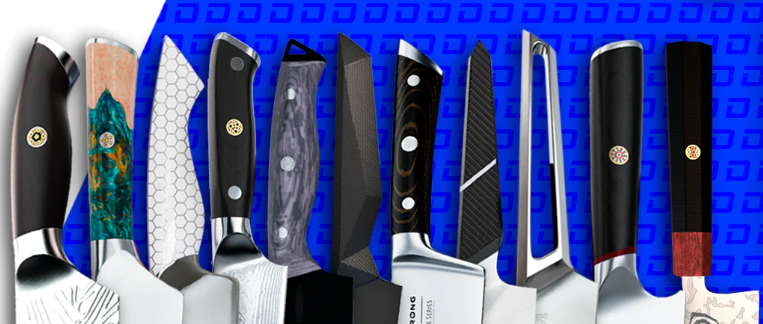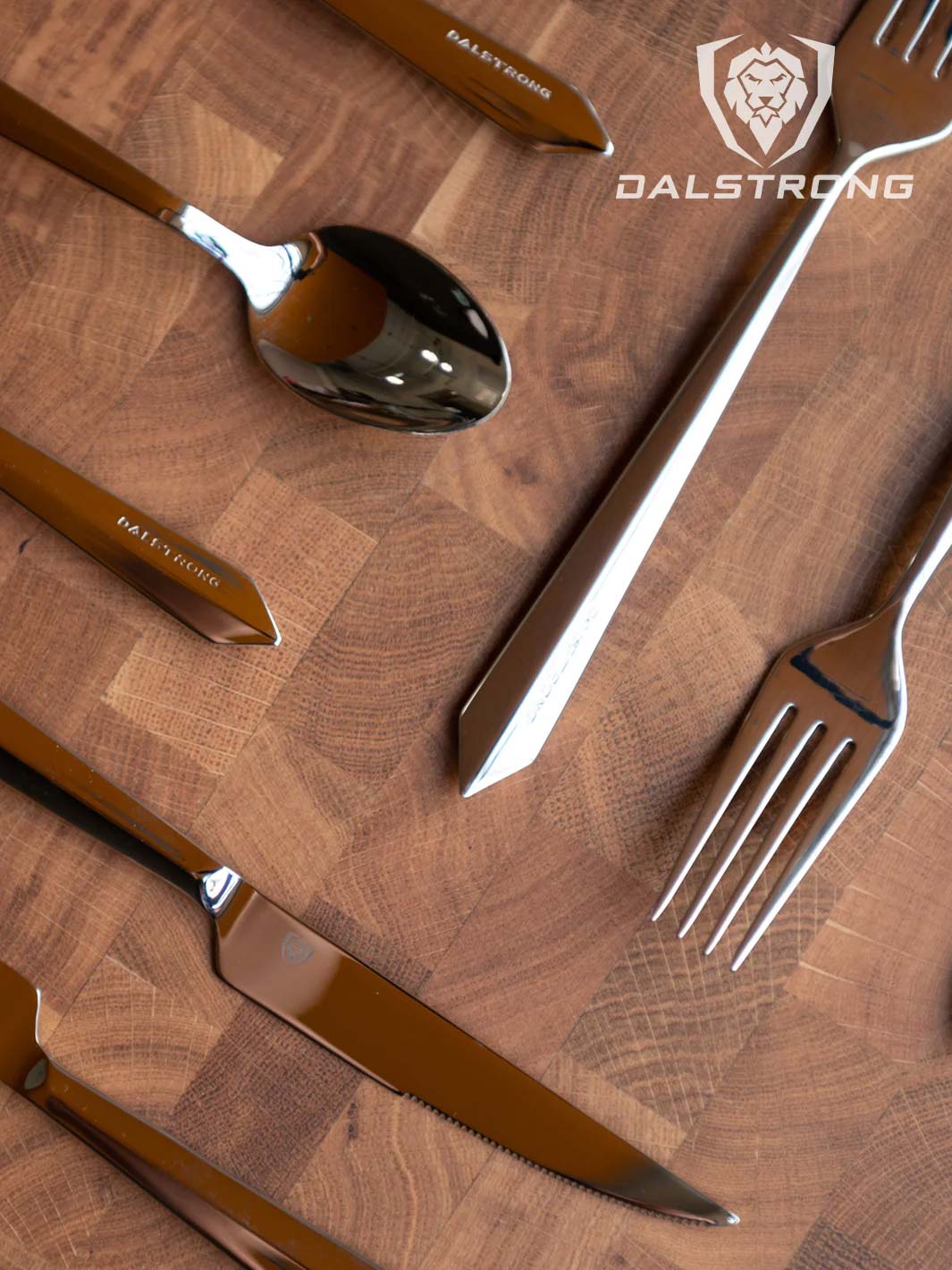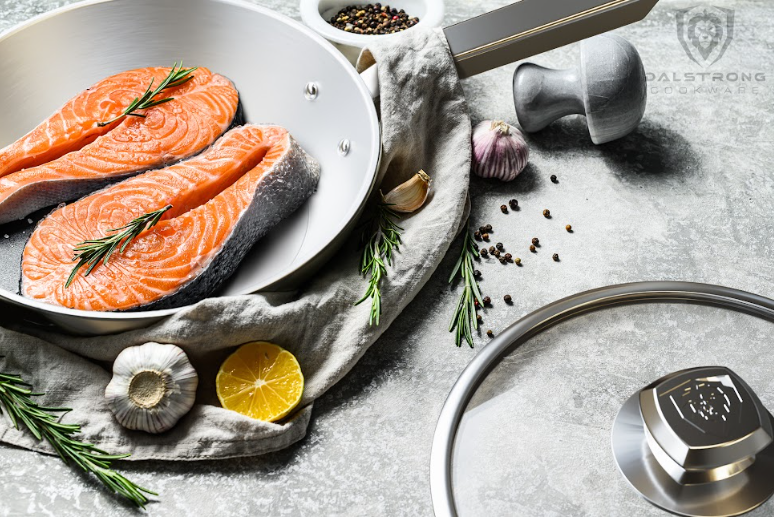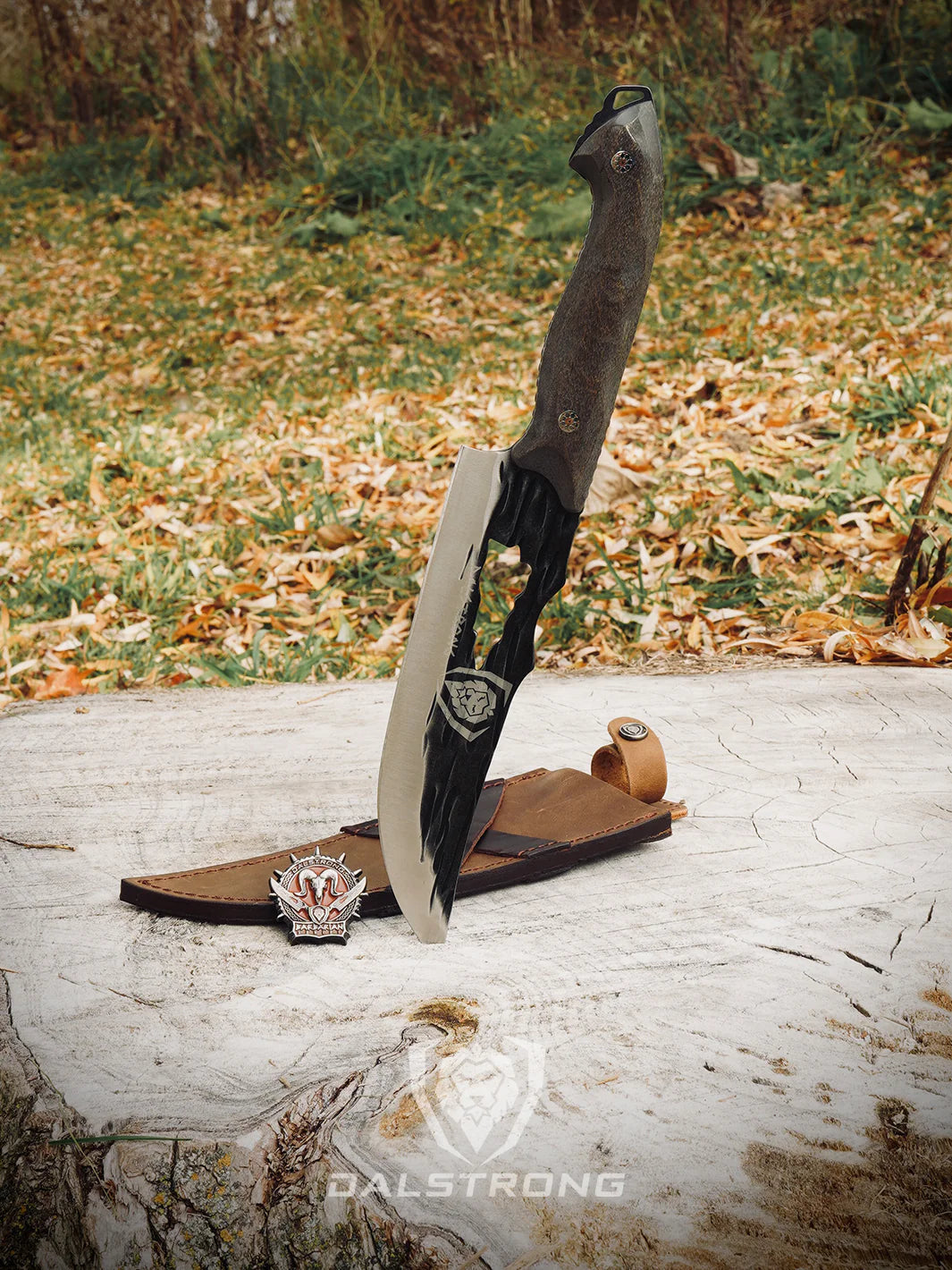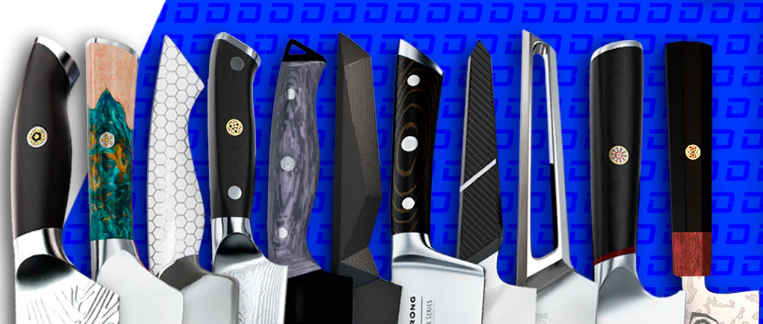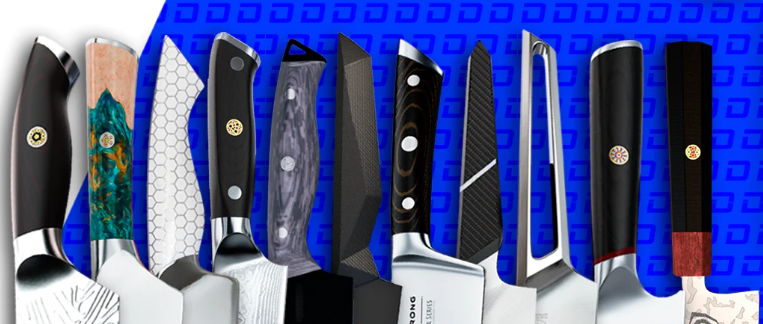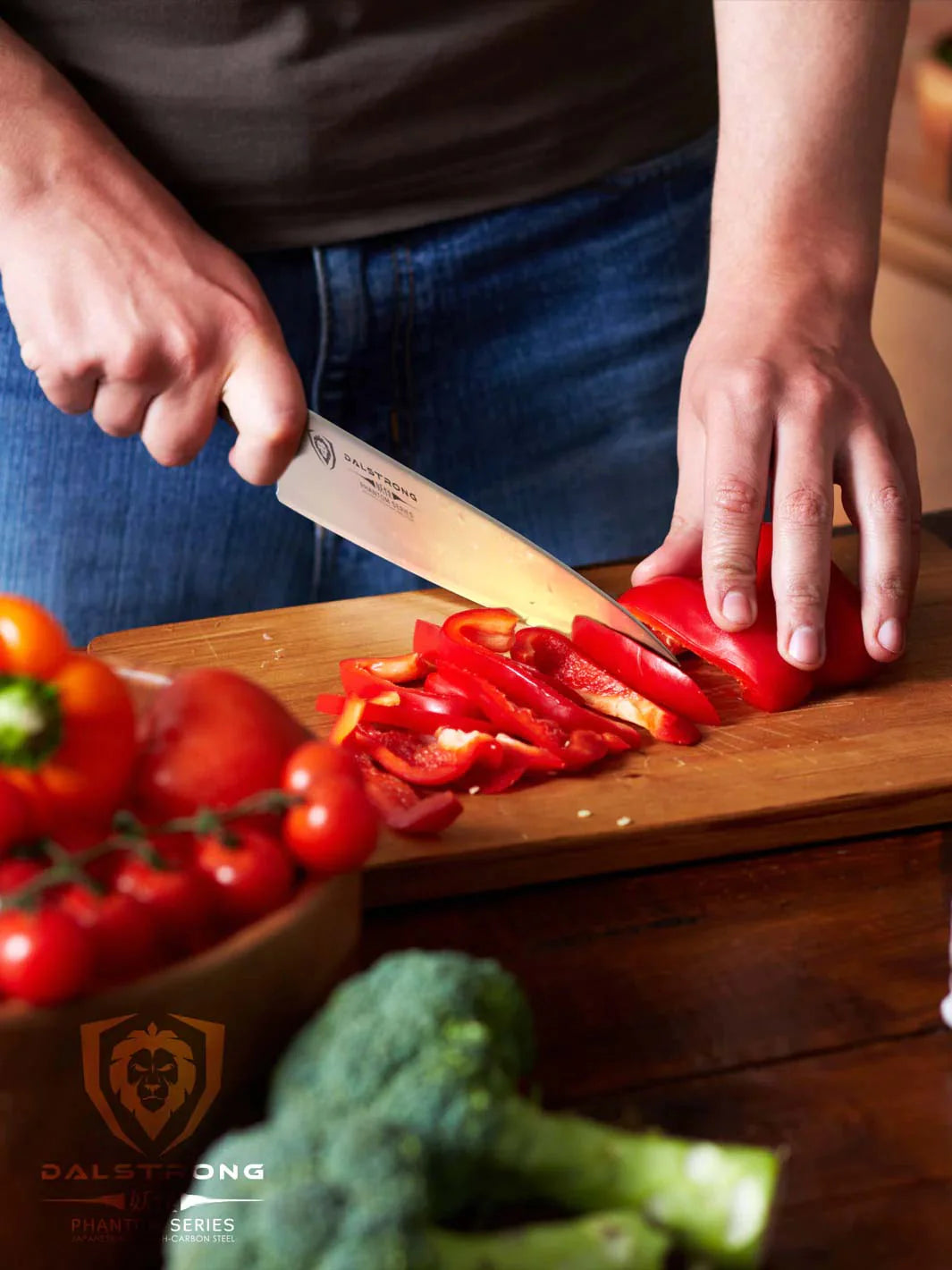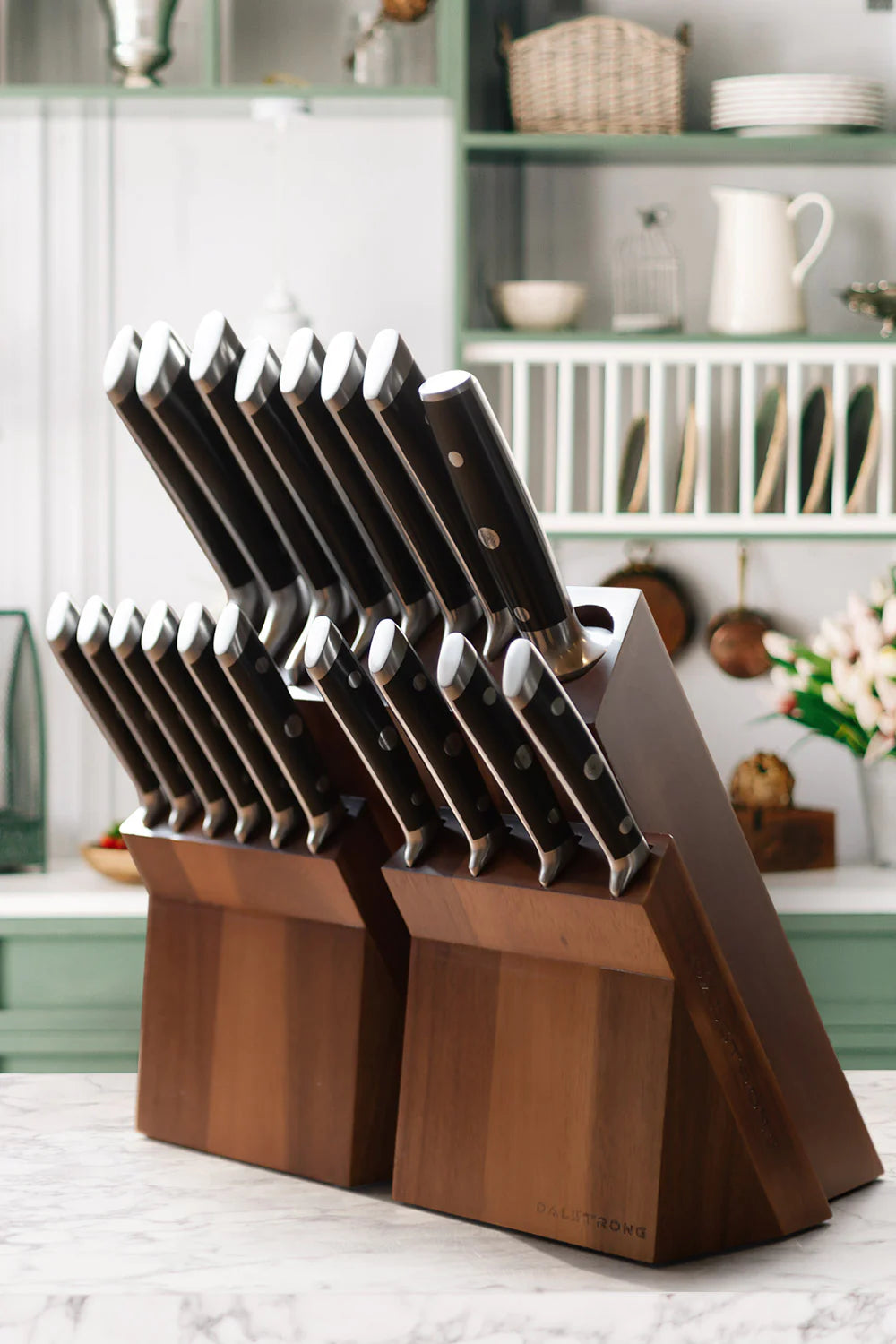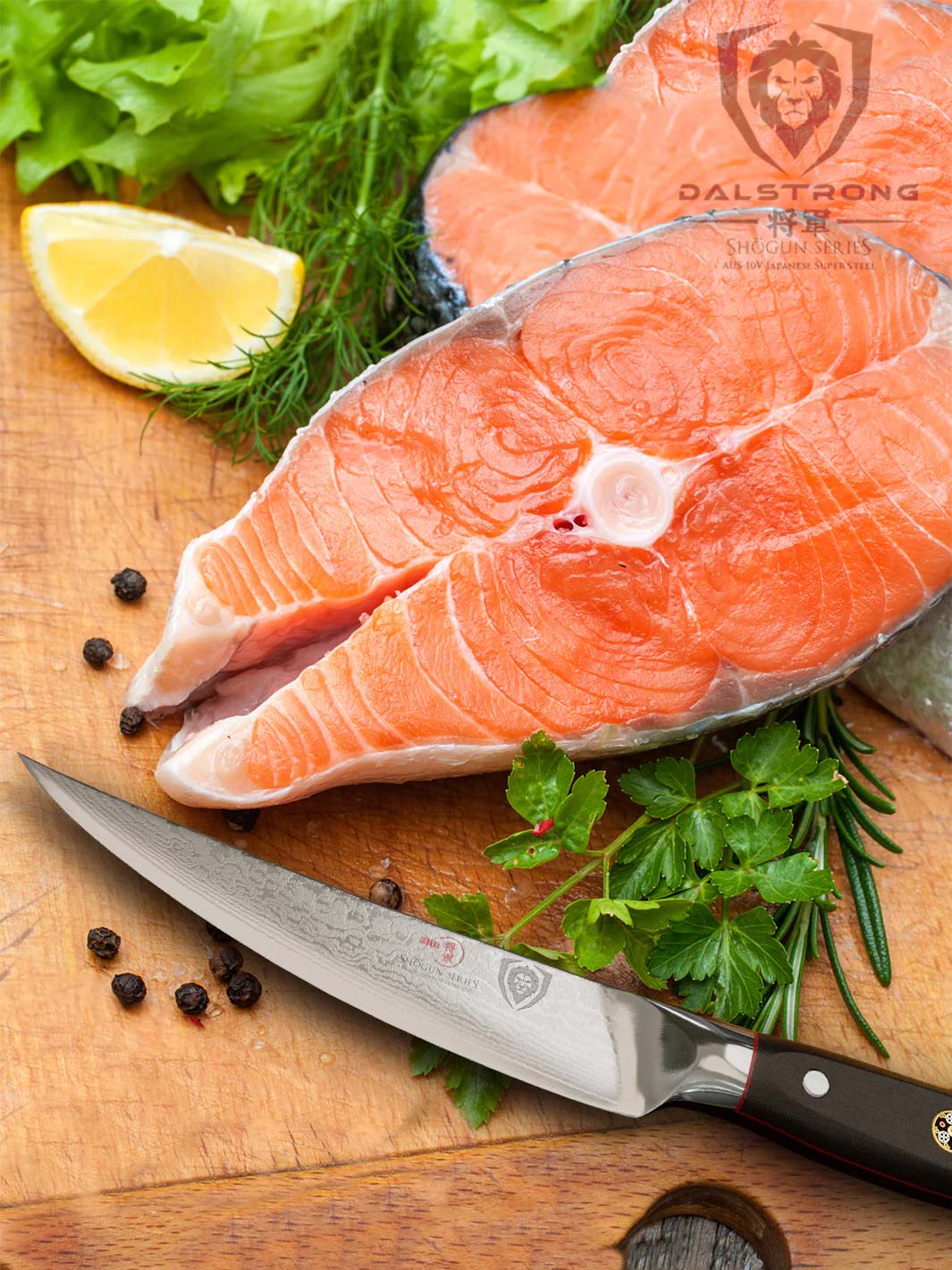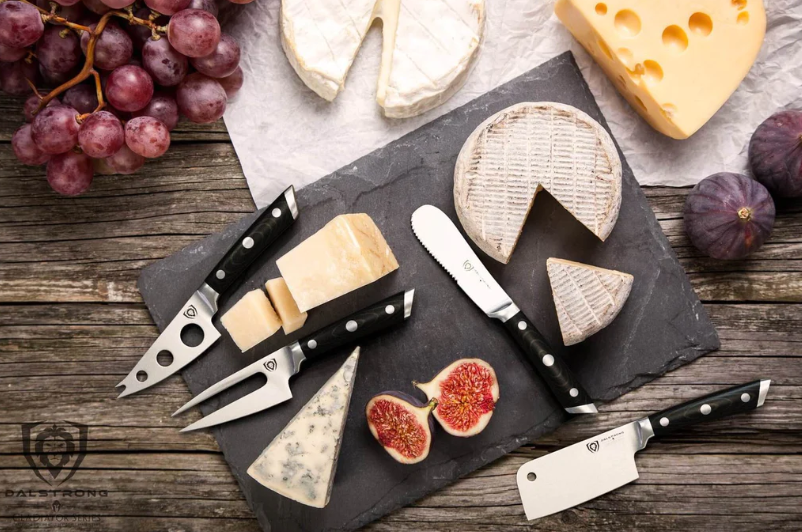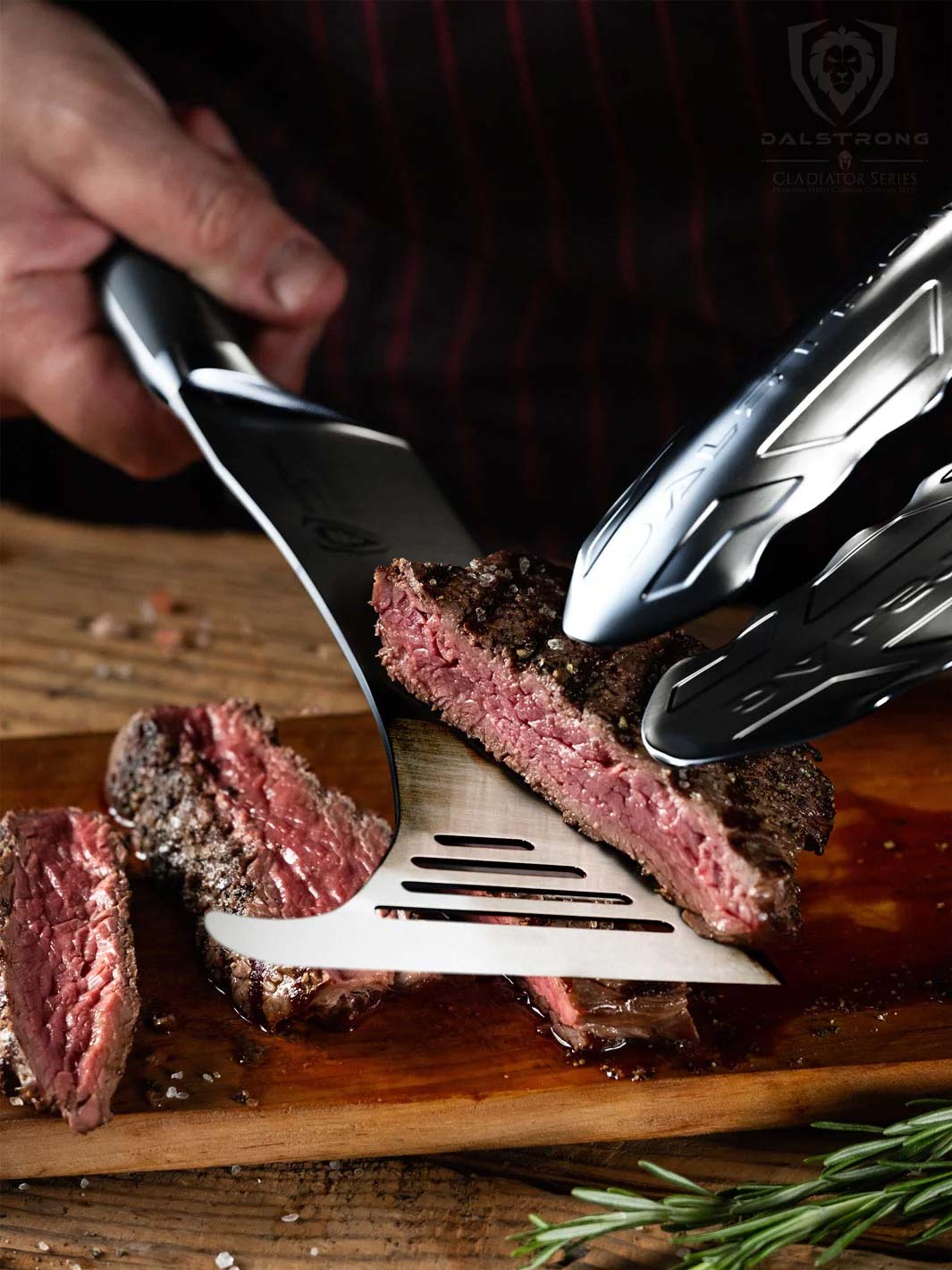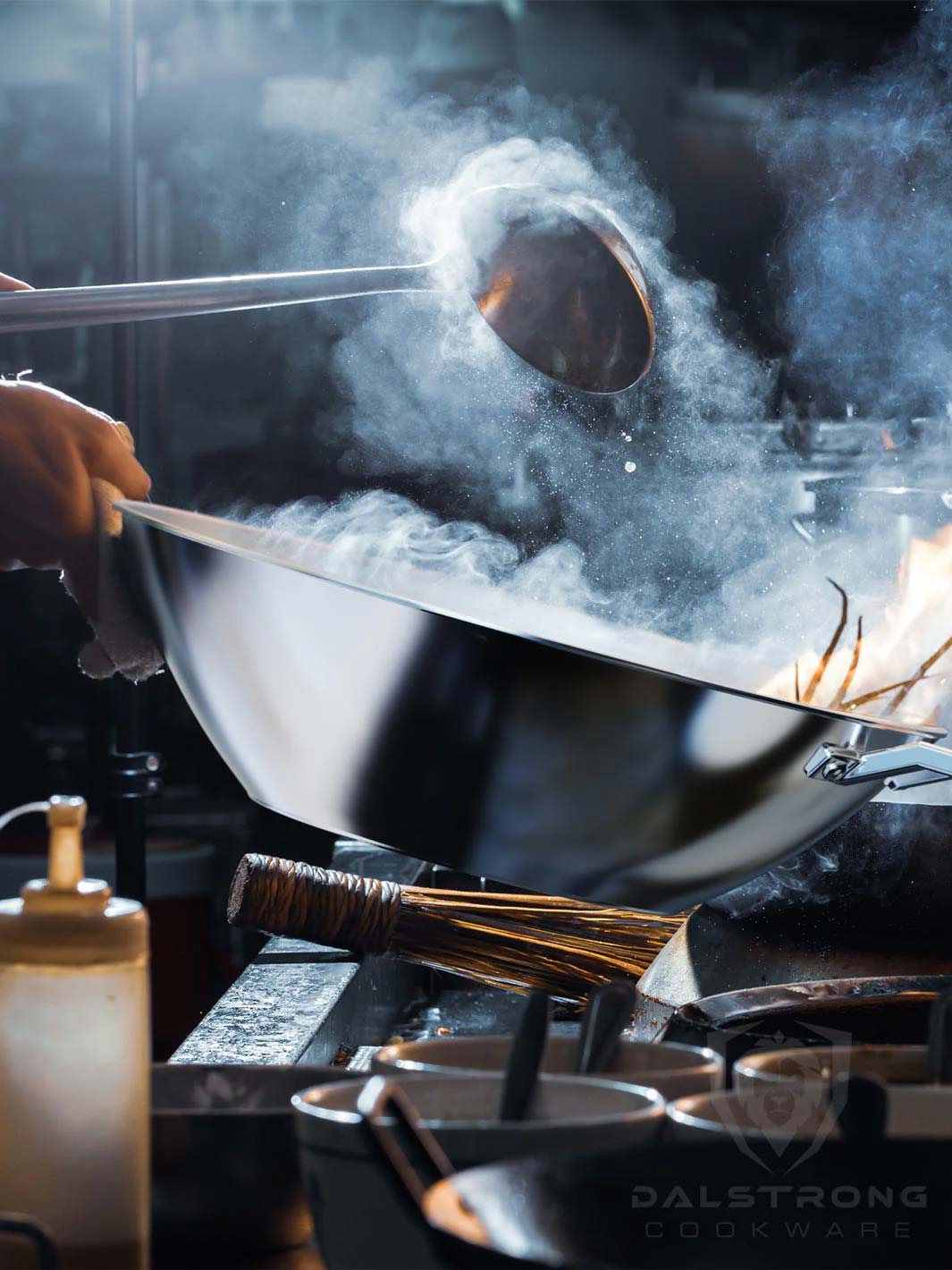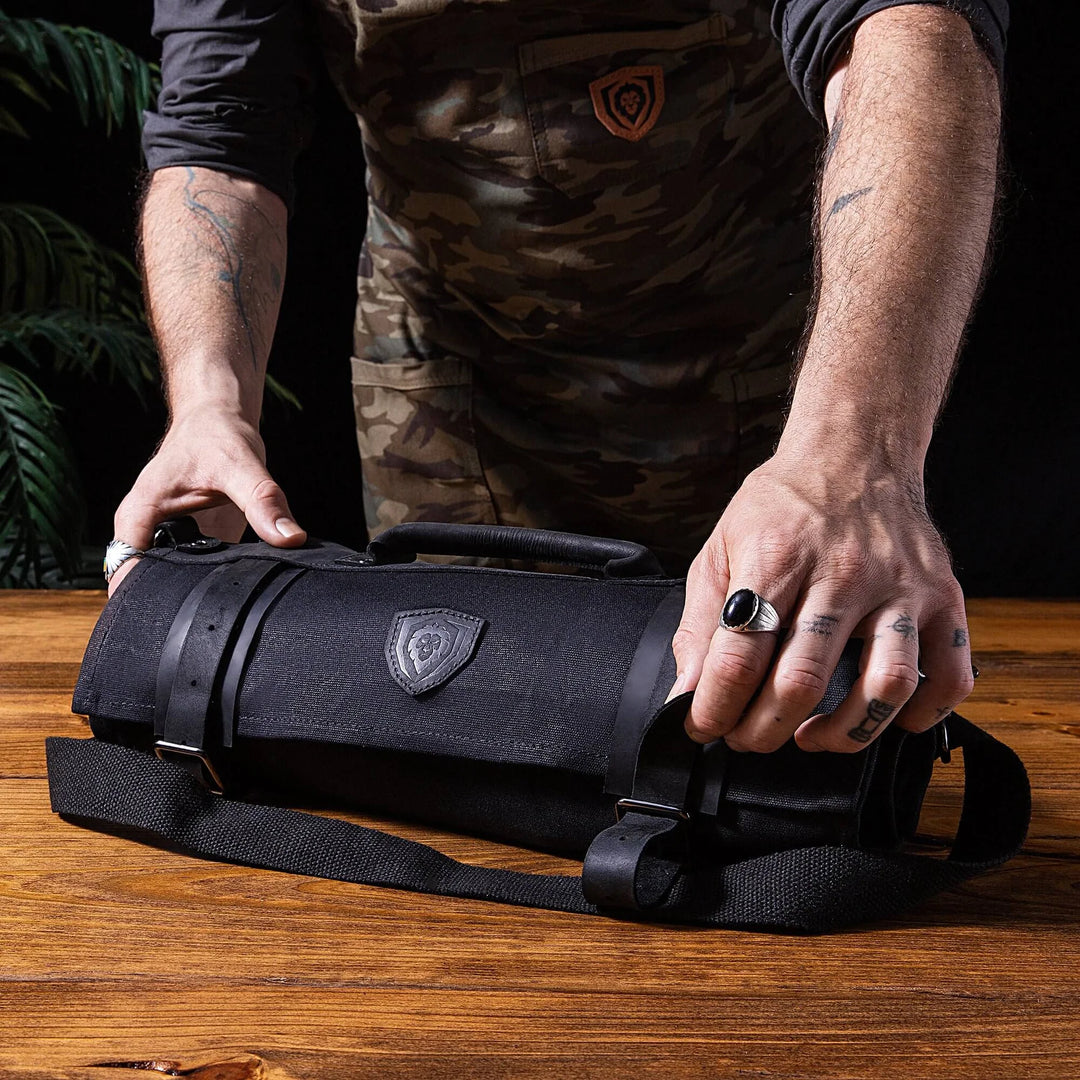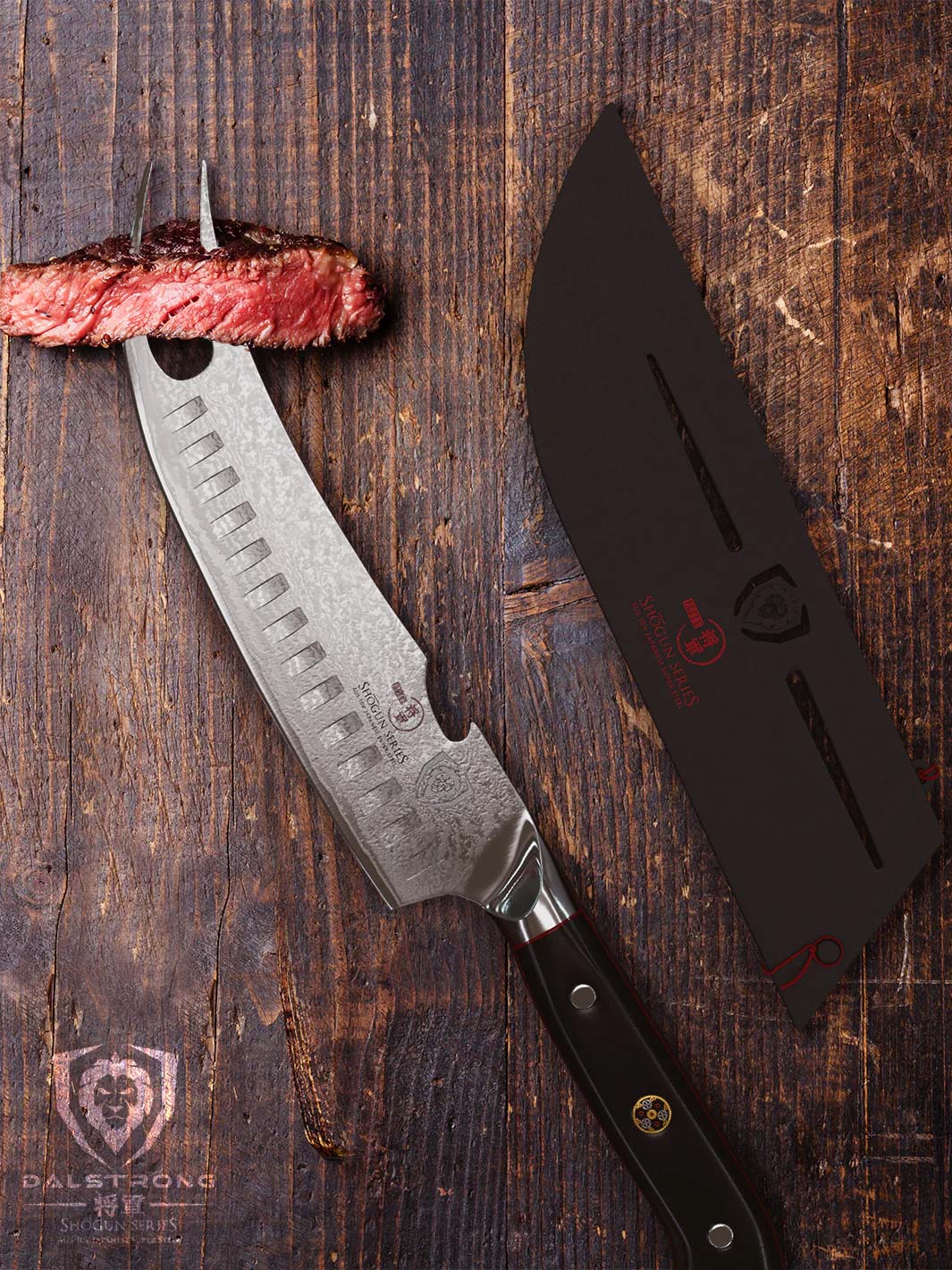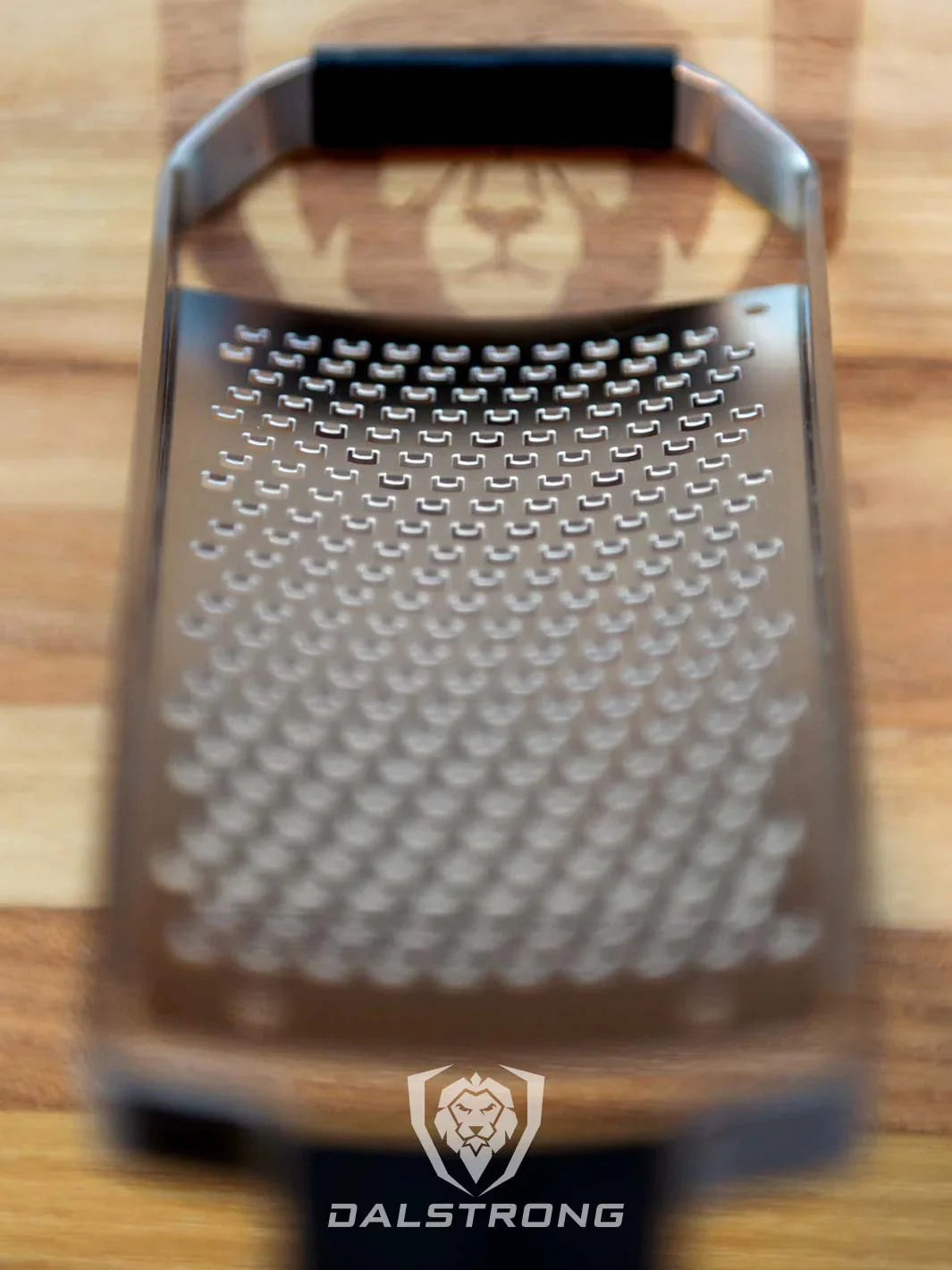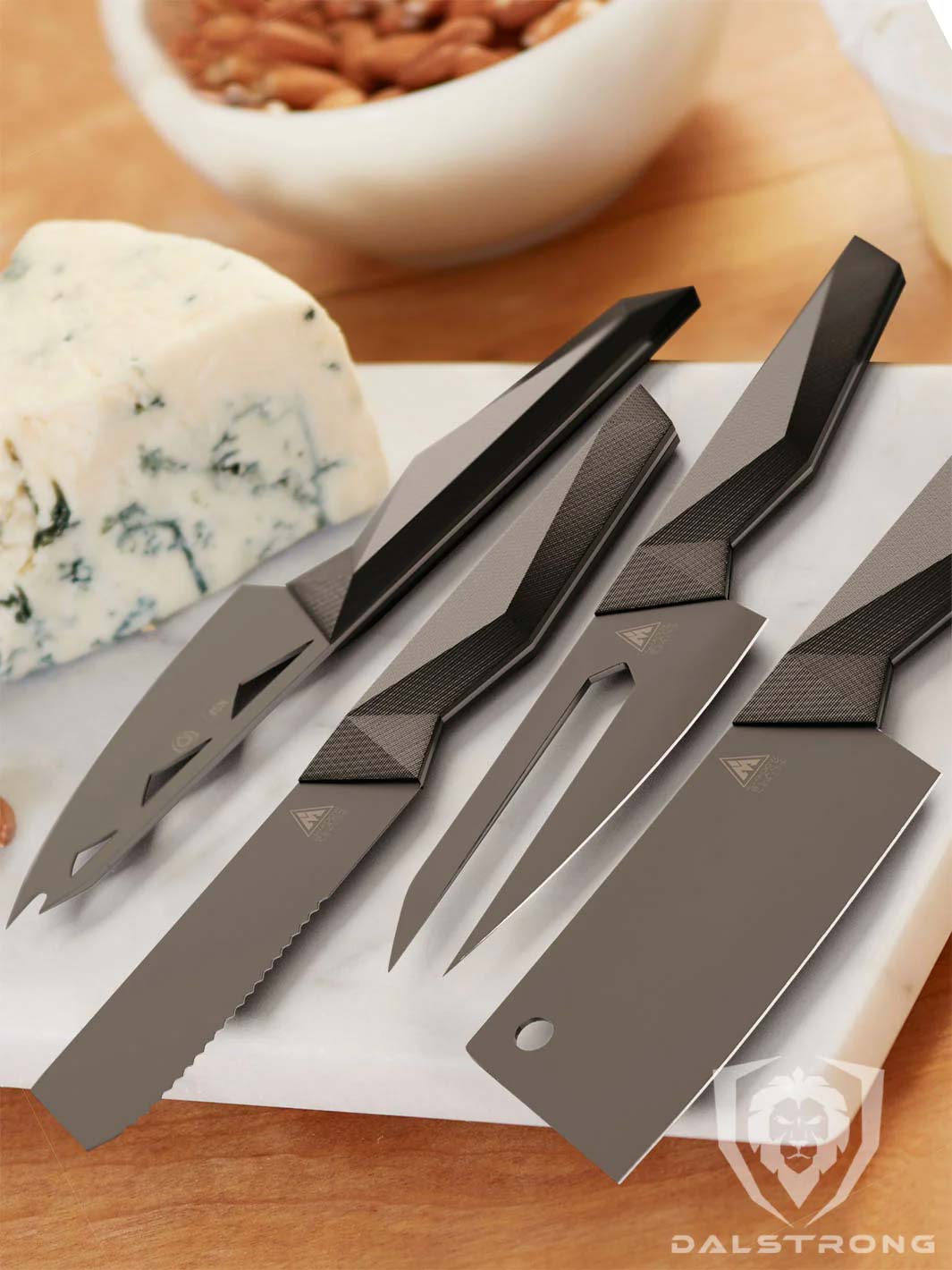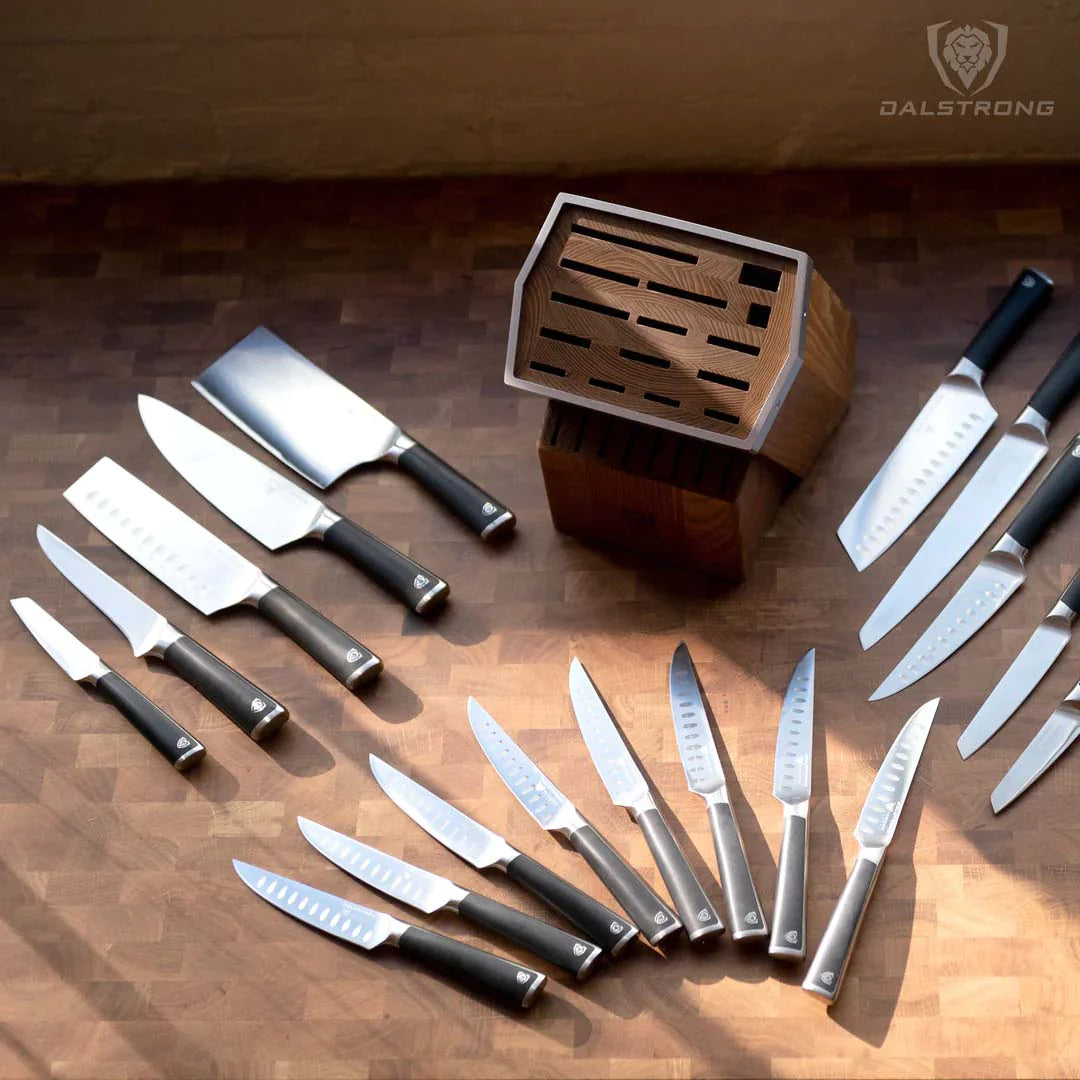Everything You Need To Know About German Knives
 Gladiator Series 8-Piece Knife Block Set
Gladiator Series 8-Piece Knife Block Set
Germany has gained worldwide recognition for its exceptional knife craftsmanship, with several top-quality German knife brands leading the industry. In this blog, we’ll be getting into everything there is to know about German knives and how you can find a Dalstrong favorite German knife.
1. History Of German Knives
German knives have a rich history that dates back centuries. These knives have earned a reputation for their exceptional quality, durability, and precise craftsmanship. Let's take a journey through the history of German knives and discover how they have become a symbol of excellence in the culinary world.
The story of German knives begins in the city of Solingen, located in western Germany. Solingen has long been renowned for its skilled craftsmen and expertise in metalworking. The region's abundant natural resources, including high-quality steel, played a crucial role in the development of the knife industry.
The tradition of knife-making in Solingen can be traced back to the Middle Ages when swords and blades were in high demand. Blacksmiths and artisans honed their skills over generations, perfecting the art of forging and shaping steel into formidable cutting tools. As Solingen's reputation grew, so did the demand for its knives.
18th and 19th centuries
In the 18th and 19th centuries, Solingen became a hub for knife production. Skilled craftsmen established workshops and small-scale factories, specializing in the creation of a wide range of knives. Their meticulous attention to detail and commitment to using the finest materials set a standard of excellence that remains to this day.
During the 19th century, advancements in industrialization revolutionized the knife-making process. Traditional hand-forging techniques gradually gave way to mechanized production, allowing for greater efficiency and higher output. However, even with the introduction of modern machinery, the traditional methods of crafting German knives were not forgotten. Many manufacturers continue to blend the best of both worlds, combining the precision of machines with longhand-finishing techniques that ensure superior quality.
German knife brands, such as Zwilling J.A. Henckels and Wüsthof, have become synonymous with craftsmanship and premium quality. These brands have upheld the legacy of German knife-making, incorporating modern innovations while staying true to the traditional artistry that defines their products.
Characteristics of German Knives
One of the distinguishing features of German knives is the use of high-carbon stainless steel. This type of steel provides exceptional sharpness, edge retention, and resistance to staining and corrosion. The blades are carefully forged, heat-treated, and tempered to achieve optimal hardness and flexibility.
German knives are known for their robust construction and ergonomic designs. The full tang construction, where the blade extends through the handle, ensures strength and balance. The handles are often made from durable materials like wood, synthetic composites, or stainless steel, providing a comfortable grip and precise control.
Modern-Day German Knives
Today, German knives are highly sought after by professional chefs and home cooks around the world. Their adaptability makes them perfect for a wide range of culinary tasks, from slicing and dicing to chopping and mincing. Whether it's Chefs knives, butcher knives, fillet knives, versatile utility knives, paring knives, steak knives, good ol’ vegetable knives, santoku knives, slicing knives, cheese knives, prep knives, a Japanese knife, or specialized carving and bread knives, German knives continue to be a staple in kitchens everywhere.
In conclusion, the history of German knives is a testament to Solingen’s craftsmen’s skill, dedication, and innovation. From their humble beginnings in the Middle Ages to the present day, German knives have maintained a reputation for exceptional quality and precision.
These knives are a blend of tradition and modernity, combining centuries-old techniques with the latest advancements in materials and manufacturing. With their outstanding performance and enduring craftsmanship, German knives are sure to continue shaping the culinary world for years to come.
2. Top German Knife Brands
Let's explore five of the most esteemed German knife brands.
Zwilling JA Henckels
Zwilling JA Henckels, a renowned German knife brand, offers a wide range of premium quality knives. With a history dating back to 1731, Zwilling J.A. Henckels is synonymous with top-notch craftsmanship.
Their knife collections, such as Zwilling Pro, Four Star, and Twin Signature, exemplify German precision and quality. A Zwilling knife is made from high-carbon stainless steel and is known for its sharpness and durability. This Solingen, Germany-based brand is highly regarded by both professional chefs and cooking enthusiasts worldwide.
Wüsthof
Wüsthof, a leading German knife manufacturer since 1814, combines traditional craftsmanship with modern innovation. The Wüsthof brand is synonymous with precision-forged knives crafted from high-carbon stainless steel. Their knife collections, such as Wüsthof Classic, Ikon, and Grand Prix II, offer a wide selection of versatile and durable kitchen knives.
Wüsthof knives, produced in Solingen, Germany, are renowned for their exceptional sharpness, edge retention, and balance. The brand's commitment to quality has solidified its reputation as a top choice among professional chefs and cooking enthusiasts worldwide.
Victorinox
While Victorinox is well-known for its Swiss Army knives, the brand also manufactures outstanding kitchen knives. Victorinox kitchen knives combine Swiss precision with German craftsmanship. Their Swiss-made kitchen knives feature high-quality stainless steel blades and ergonomic handles for optimal comfort and control.
Victorinox offers a diverse range of kitchen knife options, including chef, paring, and steak. The brand's commitment to quality and innovation has made it a preferred choice for those seeking reliable and versatile kitchen knives.
Solingen
Solingen, a city in Germany, is renowned for its knife manufacturing heritage. Knives produced in Solingen adhere to strict production standards, ensuring exceptional quality. Many prestigious German knife brands, including Zwilling J.A. Henckels and Wüsthof, have their headquarters or manufacturing facilities in Solingen. The Solingen mark signifies the superior quality of the knives produced in this region, combining centuries-old craftsmanship with modern techniques.
F. Dick
Dick, a family-owned German company established in 1778, is recognized for its commitment to craftsmanship and innovation. F. Dick knives are crafted with precision and utilize high-quality materials, including high-carbon stainless steel, to deliver outstanding performance.
The brand offers a diverse range of knives, including professional chef knives, specialized butcher knives, and fish fillet knives. F. Dick knives are trusted by professional chefs and butchers around the world for their reliability, durability, and sharpness.
3. Discover Dalstrong German Steel Knives
1. Gladiator Series NSF Certified Dalstrong
The precision-forged blade is made from high-carbon German ThyssenKrupp steel, ensuring exceptional sharpness and wear resistance. With a hand-sharpened edge at 16-18° per side, this knife strikes the perfect balance between sharpness and resilience. The tall blade height allows for knuckle clearance, making food preparation and chopping effortless.
PROS:
- Precision-forged, high-carbon German Thyssen Krupp steel for exceptional sharpness and wear resistance.
- Ergonomic and heat-resistant G10 handle for a comfortable and secure grip.
- Full tang construction and triple rivets for durability and strength.
- Includes water and stain-resistant Dalstrong PerfectFit sheath for blade protection.
CONS:
- The knife may require regular sharpening to maintain its optimal sharpness.
- The premium quality and craftsmanship come at a higher price point compared to budget options.

The sleek and striking design of this series all comes down to this German Nakiri knife. Made with razor-sharp German-made ThyssenKrupp X50CRMOV15 blade steel, rated at 58+ Rockwell, delivers exceptional performance. The seamless transition from the blade to the high-chromium stainless steel handle not only ensures hygiene but also gives the knives a modern and aggressive appearance.
PROS:
- Precision-forged German stainless steel blade for exceptional sharpness and wear resistance.
- Tapered and polished blade design for hardness, flexibility, and reduced friction.
- Seamless transition from blade to handle for hygiene and easy cleaning.
- Includes a hand-crafted Acacia wood magnetic sheath for safe knife storage and protection.
- This knife can be put on display with Dalstrong’s magnetic knife block sets.
CONS:
- The aggressive design may not appeal to those who prefer more traditional-looking knives.
- The square-tipped blade requires some adjustment which could seem a little intimidating to novice home cooks.

This German ThyssenKrupp knife has a precise angle of 16-18°, ensuring immaculate, precise cuts with excellent edge retention and a scalpel-like blade. The solid steel design of this knife is simply remarkable. Functional, tough, and robust, to say the least. But, if you need a little more convincing, keep on reading.
PROS:
- Precision-forged German stainless steel blades for exceptional sharpness and durability.
- Tapered and polished blade design for hardness, flexibility, and reduced friction.
- Seamless transition from blade to handle for hygiene and easy cleaning.
- This knife includes a hand-crafted Acacia wood magnetic sheath for secure storage and stylish protection.
CONS:
- The sleek design may not suit those who prefer a more traditional appearance.
- The set may be seen as specialized for carving and may not be suitable for small and easy kitchen tasks.
4. Gladiator Series NSF Certified Dalstrong

Crafted from a single piece of imported premium high-carbon German steel, the precision-forged blade from the Gladiator Series ensures exceptional sharpness and durability. Hand-sharpened to a razor-sharp edge at 14-16 degrees, this knife boasts excellent wear and stain resistance.
PROS:
- Precision-forged German steel blade for exceptional sharpness and durability.
- Curved blade design for a stronger grip, as well as efficient cutting.
- Rock-hollow divots minimize food adhesion and reduce friction for smoother cutting.
- Ergonomic G10 handle with triple rivets for durability and comfortable grip.
CONS:
- The length and weight of the knife may require some getting-used-to.
- The knife's specialized design could seem a little intimidating for easy culinary tasks.

Made with razor-sharp German-made ThyssenKrupp X50CRMOV15 blade steel and hardened at 58+ Rockwell, this knife from the Crusader series offers exceptional performance to home cooks and seasoned chefs. The knives are designed for busy kitchens to maintain hygiene. The seamless spine of the knife is made with high-chromium stainless steel giving it a striking appearance.
PROS:
- Precision-forged German stainless steel blade for exceptional sharpness and durability.
- Fuller groove reduces friction and prevents food from sticking, enhancing balance and ease of use.
- Ergonomic handle shape provides maximum comfort, grip, and maneuverability.
- Handcrafted Acacia wood magnetic sheath adds elegance and protection.
CONS:
- The minimalist design may not appeal to folks that prefer a grungier look on their fillet knife.
- The blade's hardness requires sharpening and honing to avoid chipping or damage.
4. How To Care For Your German Steel Knives
 18 Piece Colossal Knife Set with Block Gladiator Series Knives NSF Certified Dalstrong
18 Piece Colossal Knife Set with Block Gladiator Series Knives NSF Certified Dalstrong
German knives can be slightly on the costlier side. So, caring for them is crucial. Here are 7 steps in which you can maintain and clean your favorite knives.
- Always handwash your German knife with warm, soapy water immediately after use. Avoid placing it in the washer, as the merciless detergents and high heat can harm the handle and blade. Gently clean the blade with a soft sponge or cloth, and pay attention to food particles or dirt that are stuck on the blade.
- Thoroughly dry your knife after washing to prevent moisture buildup and potential rusting. Utilize a dry, clean cloth to wipe the blade and handle, removing all water. Avoid air-drying your knife, as it can lead to water spots and stains.
- Store your German knife in a safe and secure manner to protect both the blade and yourself. Consider using a knife block, magnetic strip, or knife sheath to keep the blade protected and prevent accidental cuts. Avoid storing your knife in a cluttered drawer where it can come into contact with other utensils and potentially get damaged.
- Regular honing helps maintain the sharpness of the blade. Use a honing steel or ceramic rod to realign the blade’s edge gently. Hold the steel at a 20-degree angle and draw the knife across the steel in a sweeping motion. Repeat this process several times on each side of the blade.
- Periodically, your German knife will require sharpening to restore its optimal cutting performance. You can either use a sharpening stone or seek professional sharpening services. Follow the instructions provided with the sharpening stone and ensure proper technique to avoid damaging the blade.
- While German knives are known for their durability, it's important to avoid using them to cut through solid materials like frozen foods or bones. Excessive force can chip or damage the blade. Instead, use a specialized bone saw or thaw frozen foods before cutting.
- Keep an eye on your German knife for any signs of wear, loose handles, or damage. Tighten any loose screws or handles and address any issues promptly. Consistent care and maintenance will prolong the life of your knife and ensure safe and efficient cutting.
5. Frequently Asked Questions
Why are German knives the best?
German knives are considered the best due to their exceptional craftsmanship, durability, and versatility. The use of high-quality German steel, such as ThyssenKrupp, ensures superior edge retention and excellent cutting performance, making them a top choice for professional chefs and cooking enthusiasts. They can be a softer steel or even a hardened, robust steel.
Are German or Japanese knives better?
The debate between German and Japanese knives frequently comes down to personal liking and the certain needs of the user. German knives are known for their robustness, durability, and versatility, making them ideal for heavy-duty tasks like chopping through bones or thick-skinned vegetables.
On the other hand, Japanese knives are renowned for their exceptional sharpness, lightweight design, and delicate accuracy, making them perfect for tasks that need intricate and precise cuts. Ultimately, the choice between German and Japanese knives depends on the individual's cooking style and preferences.
Is German steel good for knives?
German steel is considered top-notch in the knife industry thanks to its excellent quality and performance. German steel, such as ThyssenKrupp, is known for its high carbon content, which contributes to the knife's durability, toughness, and ability to hold a sharp edge. German steel also undergoes rigorous heat treatment processes, enhancing its strength and resilience and making it a reliable choice for professional chefs and home cooks alike.





















































































































